
by Ria Olivier | Sep 21, 2020 | Gough Island, Overwintering Team, SA Agulhas II, SANAP, sub-Antarctic, Take-Over Operations, Uncategorised

 Gough Island is located at 40°S, 9°W – 2600 km from East Pier, Cape Town Harbour. (Image above by Christopher Jones currently onthe Island) South Africa has been operating a weather station on Gough Island since 1956. The first overwintering team consists of 4 members , but since then the team structure has developed to include more members. The team consists of a Medical Orderly, Diesel Mechanic, Electrical Engineer and a Communications Engineer. The South African Weather Service(SAWS send a team that consist of a Senior Meteorological Technician and two Meteorological Technicians. The rest of the team is made up of 3 Field assistants of the Royal Society for the Protection of Birds(RSPB). A team leader and deputy team leader are also appointed for the duration of their time.
Gough Island is located at 40°S, 9°W – 2600 km from East Pier, Cape Town Harbour. (Image above by Christopher Jones currently onthe Island) South Africa has been operating a weather station on Gough Island since 1956. The first overwintering team consists of 4 members , but since then the team structure has developed to include more members. The team consists of a Medical Orderly, Diesel Mechanic, Electrical Engineer and a Communications Engineer. The South African Weather Service(SAWS send a team that consist of a Senior Meteorological Technician and two Meteorological Technicians. The rest of the team is made up of 3 Field assistants of the Royal Society for the Protection of Birds(RSPB). A team leader and deputy team leader are also appointed for the duration of their time.



 (Above L-R: Tshimangadzo Jufter(Jay) Munyai – Leader and Electrical Engineer, Catherine(Cathy) Mbazwana – Deputy Leader and Medical Orderly, S’Celo Ndwalane – Diesel Mechanic and Gert Benadé – Communications Engineer)
(Above L-R: Tshimangadzo Jufter(Jay) Munyai – Leader and Electrical Engineer, Catherine(Cathy) Mbazwana – Deputy Leader and Medical Orderly, S’Celo Ndwalane – Diesel Mechanic and Gert Benadé – Communications Engineer)


 (Above L-R: Zinhle(Zee) Shongwe – Senior Meteorological Technician and Meteorological Technicians (Asa) Somaxaka and Dylan Seaton (of Gough65 staying on for another year)
(Above L-R: Zinhle(Zee) Shongwe – Senior Meteorological Technician and Meteorological Technicians (Asa) Somaxaka and Dylan Seaton (of Gough65 staying on for another year)


 (Above L-R: RSPB field assistants; Vonica Perold, Roelf Daling and Kim Stevens
(Above L-R: RSPB field assistants; Vonica Perold, Roelf Daling and Kim Stevens
 As with Marion77 overwintering team the 2020 annual S.A. Agulhas II relief voyage to Gough Island departed on 19 September 2020 under strict Covid-19 health protocols. In the midst of these protocols and given the clear the Gough 66 made time to be part of South Africa Heritage Celebrations and answered the call by President Ramaphosa and create a video of the #JeruslaemDanceChallenge (have a look on Facebook). Gough will stop at Tristan de Cunha on the way to Gough Island and then Gough 66 will take-over form Gough65
As with Marion77 overwintering team the 2020 annual S.A. Agulhas II relief voyage to Gough Island departed on 19 September 2020 under strict Covid-19 health protocols. In the midst of these protocols and given the clear the Gough 66 made time to be part of South Africa Heritage Celebrations and answered the call by President Ramaphosa and create a video of the #JeruslaemDanceChallenge (have a look on Facebook). Gough will stop at Tristan de Cunha on the way to Gough Island and then Gough 66 will take-over form Gough65
 (Above L-R: Richard Hall – Logistics Manager, Vonica Perold, Roelf Daling and Kim Stevens – RSPB Field Asisstants and Nini van der Merwe(BirdlifeSA) with poster of restoration programme. The Gough Island Restoration 2021 also gets underway with the departure of Gough 66. RSPB;” Six months after having made the devastating decision to postpone the 2020 restoration of Gough Island, our team is back in strength and starting to gear up for what we hope will be a 2021 mouse eradication attempt.”
(Above L-R: Richard Hall – Logistics Manager, Vonica Perold, Roelf Daling and Kim Stevens – RSPB Field Asisstants and Nini van der Merwe(BirdlifeSA) with poster of restoration programme. The Gough Island Restoration 2021 also gets underway with the departure of Gough 66. RSPB;” Six months after having made the devastating decision to postpone the 2020 restoration of Gough Island, our team is back in strength and starting to gear up for what we hope will be a 2021 mouse eradication attempt.”


 Above a few preliminary team photos (L-R: girls of 66, Team66, Guys of 66) Follow #GOUGH66 on Twitter @Antarcticlegacy and Facebook
Above a few preliminary team photos (L-R: girls of 66, Team66, Guys of 66) Follow #GOUGH66 on Twitter @Antarcticlegacy and Facebook

by Ria Olivier | Sep 16, 2020 | Announcement, Gough Island, Overwintering Team, SA Agulhas II, sub-Antarctic, Take-Over Operations, Tristan da Cunha
 Department of Environment Forestry and Fisheries : Media Statement – 15 September 2020 : SA Agulhas II will depart for Gough Island under strict health protocols:
Department of Environment Forestry and Fisheries : Media Statement – 15 September 2020 : SA Agulhas II will depart for Gough Island under strict health protocols:
The 2020 annual SA Agulhas II relief voyage to Gough Island will depart on 17 September 2020 under strict Covid-19 health protocols.

by Ria Olivier | Jul 19, 2020 | Fellowship, Research, SA Agulhas II, SANAP, Science, SEAmester, Southern Ocean

 The SEAmester programme is a marine science winter school founded by Prof. Isabelle Ansorge of UCT which takes place at sea and provides the perfect platform for coupling both academic research and learning. Every year approximately 100 students, lecturers and scientists from over 15 different institutions (both local and international) come together for approximately 10 days at sea onboard the SA Agulhas II. SEAmester exposes postgraduate students to multiple different marine science disciplines through daily lectures, practicals, and regular interaction with many professionals conducting their research onboard South Africa’s state of the art research vessel.
The SEAmester programme is a marine science winter school founded by Prof. Isabelle Ansorge of UCT which takes place at sea and provides the perfect platform for coupling both academic research and learning. Every year approximately 100 students, lecturers and scientists from over 15 different institutions (both local and international) come together for approximately 10 days at sea onboard the SA Agulhas II. SEAmester exposes postgraduate students to multiple different marine science disciplines through daily lectures, practicals, and regular interaction with many professionals conducting their research onboard South Africa’s state of the art research vessel.
 3 of the 4 previous SEAmester cruises have sampled the Agulhas System Climate Array (ASCA) transect. ASCA was an array of moorings deployed across the Agulhas Current from April 2016 to May 2018, in order to better understand the physical properties and dynamics of the Agulhas Current. The ASCA project extended the research undertaken along this array during the Agulhas Current Time-series project by continuing to sample the same 20 hydrographic stations. In-situ data in the Agulhas Current is very rare, and the collaborative, multi-disciplinary approach adopted during SEAmester has greatly improved our understanding of the complex Agulhas Current System. More information in paper by Morris et al., 2017 Above: Location of the stations sampled during SEAmester. Figure by James Maitland.
3 of the 4 previous SEAmester cruises have sampled the Agulhas System Climate Array (ASCA) transect. ASCA was an array of moorings deployed across the Agulhas Current from April 2016 to May 2018, in order to better understand the physical properties and dynamics of the Agulhas Current. The ASCA project extended the research undertaken along this array during the Agulhas Current Time-series project by continuing to sample the same 20 hydrographic stations. In-situ data in the Agulhas Current is very rare, and the collaborative, multi-disciplinary approach adopted during SEAmester has greatly improved our understanding of the complex Agulhas Current System. More information in paper by Morris et al., 2017 Above: Location of the stations sampled during SEAmester. Figure by James Maitland.
 Left: Last year during SEAmester IV we experienced 3 consecutive cold fronts with resulting waves of up to 10m in size. This rough weather meant we were only able to sample 16 out of 20 of our planned stations. Photo credit: Thando Mazomba
Left: Last year during SEAmester IV we experienced 3 consecutive cold fronts with resulting waves of up to 10m in size. This rough weather meant we were only able to sample 16 out of 20 of our planned stations. Photo credit: Thando Mazomba
Sampling during SEAmester IV has included physical oceanography, biogeochemistry, phytoplankton, zooplankton, ichthyoplankton, microplastics, marine parasites, marine bacteria, marine seabirds and mammals, meteorology, benthic dredge sampling and more. SEAmester has provided an incredible opportunity for scientists from different disciples to work together and at the same time providing students with invaluable seagoing experience. The 5th SEAmester cruise which was due to take place this week has unfortunately been postponed until next year due to COVID-19.
 SEAmester has changed the lives of students! “Department of Science and Innovation’s 10-year Global Change Grand Challenge programme requires platforms to ‘attract young researchers and retain them by exciting their interest in aspects of global change; while developing their capacity and professional skills in the relevant fields of investigation.” – Isabelle Ansorge
SEAmester has changed the lives of students! “Department of Science and Innovation’s 10-year Global Change Grand Challenge programme requires platforms to ‘attract young researchers and retain them by exciting their interest in aspects of global change; while developing their capacity and professional skills in the relevant fields of investigation.” – Isabelle Ansorge
- “This programme has been the best experience in my life. It changed my outlook on how to gather knowledge, where to do research, how to think logically as well as to be creative and intuitive”
- “I have made so many new friends and build up my contacts for future endeavours”
- “SEAmester has made me realise that I have a passion for ocean-based research”
- “It has greatly influenced my general career goals and aims”
- “I really enjoyed meeting so many people from a diverse range of backgrounds and sciences”
- “I loved the way the content of SEAmester has helped me to link up all the theory that I have learnt over the years”
- “SEAmester was the best experience of my life”
- “I hope that SEAmester will continue in years so other students get the chance to have such an awesome experience”
- “I have been changed positively by this course – I am more motivated to tackle my studies”
- Just being together as a team – it didn’t matter what your background was”
- “It was a time of my life that I will never ever forget”

 Text Supplied by Laura Braby – SAEON- Egagasini Node. Student Comments supplied by Isabelle Ansorge. Images available on Antarctic Legacy of South Africa Archive. More videos and images available at www.seamester.co.za
Text Supplied by Laura Braby – SAEON- Egagasini Node. Student Comments supplied by Isabelle Ansorge. Images available on Antarctic Legacy of South Africa Archive. More videos and images available at www.seamester.co.za

by Ria Olivier | Jul 17, 2020 | Antarctica, Research, SA Agulhas II, SANAP Student, Science, SEAmester, Southern Ocean
 Where did it all started for Tahlia: “From an early age I have had an unbridled passion for the ocean and understanding technology, which led me to pursue my studies in Oceanography at the Cape Peninsula University of Technology (CPUT). I chose to study here as it provided a platform to not only gain academic experience within an oceanographic context, but to also gain field experience. In my third year (2014) I was placed at Bayworld Centre of Research and Education (BCRE) in order to complete a number of research projects which spanned across an array of oceanographic disciplines, namely: Marine Instrumentation, Marine Resource Management, Ocean Sciences and Marine Outreach. This placement exposed me to the different aspects of oceanography and allowed me to find my particular field of interest. It was there, at BCRE, that I was exposed to physical oceanography, data processing and development of marine instrumentation. I knew that I had found my niche within the oceanographic community and would strive to further my education, work experience and continue to learn and grow within this sector. After earning a National Diploma, I completed a BTech degree where I continued to work part-time at BCRE and develop my final research project. This project focused on the development of two sub-sea moorings, each housing a 75 kHz Acoustic Doppler Current Profiler (ADCP), which I was fortunate enough to deploy between two sub-Antarctic Islands—Marion Island and Prince Edward Island—while aboard the research vessel, SA Agulhas II.
Where did it all started for Tahlia: “From an early age I have had an unbridled passion for the ocean and understanding technology, which led me to pursue my studies in Oceanography at the Cape Peninsula University of Technology (CPUT). I chose to study here as it provided a platform to not only gain academic experience within an oceanographic context, but to also gain field experience. In my third year (2014) I was placed at Bayworld Centre of Research and Education (BCRE) in order to complete a number of research projects which spanned across an array of oceanographic disciplines, namely: Marine Instrumentation, Marine Resource Management, Ocean Sciences and Marine Outreach. This placement exposed me to the different aspects of oceanography and allowed me to find my particular field of interest. It was there, at BCRE, that I was exposed to physical oceanography, data processing and development of marine instrumentation. I knew that I had found my niche within the oceanographic community and would strive to further my education, work experience and continue to learn and grow within this sector. After earning a National Diploma, I completed a BTech degree where I continued to work part-time at BCRE and develop my final research project. This project focused on the development of two sub-sea moorings, each housing a 75 kHz Acoustic Doppler Current Profiler (ADCP), which I was fortunate enough to deploy between two sub-Antarctic Islands—Marion Island and Prince Edward Island—while aboard the research vessel, SA Agulhas II.

 Following the completion of my BTech degree, I continued to work on this mooring data over the next four years, returning to Marion Island and ensuring the safe retrieval and re-deployment of the sub-sea moorings. The data collected formulated the basis of my MSc research project, entitled Impact of ocean variability on Shelf-Seas surrounding the sub-Antarctic Prince Edward Islands.
Following the completion of my BTech degree, I continued to work on this mooring data over the next four years, returning to Marion Island and ensuring the safe retrieval and re-deployment of the sub-sea moorings. The data collected formulated the basis of my MSc research project, entitled Impact of ocean variability on Shelf-Seas surrounding the sub-Antarctic Prince Edward Islands.
In conjunction with my studies I’ve had the opportunity to take part in numerous oceanographic research cruises and expeditions. My first cruise, on board the RV Algoa with the operational oceanographic team from BCRE, exposed me to deep-sea mooring operations, in-situ data collection and hydrographic measurements. After this I joined the SA Agulhas II on its annual expedition to Gough Island and Tristan da Cunha, thereafter opening the door for numerous further excursions to sea. My subsequent extensive seagoing experience of over 20 cruises, from the North Sea, to sub-Antarctic islands, to Antarctica, has seen my responsibilities range from regularly being an oceanographic technician to acting as chief scientist on multiple occasions. In 2016 I was appointed as the co-ordinator of SEAmester, South Africa’s Class Afloat, which revealed a very different aspect of seagoing work, mainly from a logistic point of view and stepping into a teaching role. It has been truly rewarding to watch this programme grow over the last 5 years while working closely with Prof. Isabelle Ansorge, the Head of Department of Oceanography at the University of Cape Town. Together, we were able to mimic this programme on an international multi-disciplinary research cruise, the Antarctic Circumpolar Expedition (ACE), on board the RV Akademik Tryoshnikov as Leg Zero of a three-legged voyage.


 More recently I have been exposed to the commercial oceanographic industry by working as a marine technician for Lwandle Marine Technologies. Albeit a brief time spent with Lwandle, I have experienced a very different aspect of oceanography in practice. I worked on a variety of contracts utilising skills I’ve gained over the years such as commercial diving operations, in situ data collection and hands-on instrumentation repairs/maintenance. These contracts also opened the door to innovative ways of thinking, problem solving and team work. I was also involved in equipment sales, field trip logistics and ‘meet and greets’ with clients which have been a great learning opportunity.
More recently I have been exposed to the commercial oceanographic industry by working as a marine technician for Lwandle Marine Technologies. Albeit a brief time spent with Lwandle, I have experienced a very different aspect of oceanography in practice. I worked on a variety of contracts utilising skills I’ve gained over the years such as commercial diving operations, in situ data collection and hands-on instrumentation repairs/maintenance. These contracts also opened the door to innovative ways of thinking, problem solving and team work. I was also involved in equipment sales, field trip logistics and ‘meet and greets’ with clients which have been a great learning opportunity.

 In December 2018 I was hired by the Flotilla Foundation and Weddell Sea Expedition (WSE) to serve on board the SA Agulhas II for the WSE chartered voyage. I was employed as the CTD technician, CTD data analyst, laboratory manager and winch driver for all tethered instruments. It was truly a great privilege to form part of this prestigious voyage, conducting science around the Larsen ice-shelf, Weddell Sea basin and finally hunting for Sir Ernest Shackleton’s Endurance.
In December 2018 I was hired by the Flotilla Foundation and Weddell Sea Expedition (WSE) to serve on board the SA Agulhas II for the WSE chartered voyage. I was employed as the CTD technician, CTD data analyst, laboratory manager and winch driver for all tethered instruments. It was truly a great privilege to form part of this prestigious voyage, conducting science around the Larsen ice-shelf, Weddell Sea basin and finally hunting for Sir Ernest Shackleton’s Endurance.
In September 2019, I was accepted into the Hydrography MSc (taught Masters) programme offered at Plymouth University in England. Moving away from my family to a new country and starting a new masters seemed a daunting task. However, it was made easier by the amazing friends I made abroad. Plymouth became my home away from home and my friends became family. I gained an incredible amount of hands on experience within the Hydrographic industry and gained invaluable skills as a junior surveyor. Our lecturers are extremely dedicated and ensured that we were saturated in hydrographic literature and at the fore front of cutting edge hydrographic technology used within the industry. I am currently completing my dissertation in volumetric analysis of sediment transport over a prestigious ship wreck site. This is to aid the conservation, management of the wreck site and to provide first pass description of the sedimentology of the area. I am so excited about what the future may hold and look forward to blazing a path within the hydrographic industry and grow as a hydrographic surveyor.
 I love my career as it is ever changing and growing with the current climate or latest technological advances. I have been able to see the world, visit remote and beautiful locations, sail the high seas and build incredible bonds with fellow scientists. It isn’t always an easy journey, but conquering the challenge of this lifestyle and career choice is what makes it worthwhile. The sense of adventure is never ending and I’m always learning along the way. Madame Curie once said that nothing in life is to be fear but rather understood, so that we understand more and fear less. I think this gives us a great sense of pride in what we do and to strive to be curious about our world, to best understand, preserve it and pass the torch on to future generations.
I love my career as it is ever changing and growing with the current climate or latest technological advances. I have been able to see the world, visit remote and beautiful locations, sail the high seas and build incredible bonds with fellow scientists. It isn’t always an easy journey, but conquering the challenge of this lifestyle and career choice is what makes it worthwhile. The sense of adventure is never ending and I’m always learning along the way. Madame Curie once said that nothing in life is to be fear but rather understood, so that we understand more and fear less. I think this gives us a great sense of pride in what we do and to strive to be curious about our world, to best understand, preserve it and pass the torch on to future generations.
 To future researchers, be diligent, work hard and persevere throughout your career. There will be challenging days but there will also be days that out shadow the challenges and fuel your passion for science. Always be teachable no matter your age, and always willing to learn and lend a hand to your fellow scientists. The work you do throughout your career will not only impact and improve your life but will pave the way for those coming up behind you. So take pride in what your work, rise up to the challenges and enjoy the journey! (Right: Photo credit:Alexander Oelofse during SEAmester)
To future researchers, be diligent, work hard and persevere throughout your career. There will be challenging days but there will also be days that out shadow the challenges and fuel your passion for science. Always be teachable no matter your age, and always willing to learn and lend a hand to your fellow scientists. The work you do throughout your career will not only impact and improve your life but will pave the way for those coming up behind you. So take pride in what your work, rise up to the challenges and enjoy the journey! (Right: Photo credit:Alexander Oelofse during SEAmester)
Links to follow Tahlia or read more
Text and Images supplied by Tahlia Henry

by Ria Olivier | Jul 15, 2020 | Discover, Research, SA Agulhas II, SANAP, Science, SEAmester, Southern Ocean, STEM, Women in Science



 Isabelle as a child always wanted to be an oceanographer. “When I was 13 my father sent me off for 6 months on a Tall Ship to sail around Africa. And so, having grown up on sailing ships and sailing the world at a very young age it seemed only natural to follow in my passion to build a career around the sea.
Isabelle as a child always wanted to be an oceanographer. “When I was 13 my father sent me off for 6 months on a Tall Ship to sail around Africa. And so, having grown up on sailing ships and sailing the world at a very young age it seemed only natural to follow in my passion to build a career around the sea.


 I first studied at Plymouth University in the UK, where I completed a BSc in Ocean Sciences in 1992. I came to South Africa in 1993 and under the mentorship of Professor Lutjeharms in the Oceanography Department at UCT I started to turn this passion into a sea-going academic career.
I first studied at Plymouth University in the UK, where I completed a BSc in Ocean Sciences in 1992. I came to South Africa in 1993 and under the mentorship of Professor Lutjeharms in the Oceanography Department at UCT I started to turn this passion into a sea-going academic career.


 One of my first jobs at UCT was to gain seagoing experience in working with all ship-based equipment. I loved being at sea and felt that after my many experiences on both national and international research vessels that I would be good at teaching practical oceanography. And so began a long period of sea-going adventures between 1996 and 2016 in which UCT Honours students were taken to sea onboard the old SA Agulhas I and from 2012 the new SA Agulhas II. The training was always part of the 5 week Prince Edward Island relief voyage and in those days students had to work the winches, drive the CTD software, work up the data for mini-projects!
One of my first jobs at UCT was to gain seagoing experience in working with all ship-based equipment. I loved being at sea and felt that after my many experiences on both national and international research vessels that I would be good at teaching practical oceanography. And so began a long period of sea-going adventures between 1996 and 2016 in which UCT Honours students were taken to sea onboard the old SA Agulhas I and from 2012 the new SA Agulhas II. The training was always part of the 5 week Prince Edward Island relief voyage and in those days students had to work the winches, drive the CTD software, work up the data for mini-projects!

 Isabelle’s Working Life: “I was employed as a lecturer at UCT in 2006 and have worked hard to build a career both nationally and internationally in observational oceanography. My passion and love for the sea can be seen in the many opportunities that I create for students both at UCT, and as can be seen from the SEAmester Floating University across the entire country. I was the first female PhD graduate in Oceanography at UCT in 2000, I am the only female Full Professor in the Oceanography Department and the first female Head of Department in 2016. “
Isabelle’s Working Life: “I was employed as a lecturer at UCT in 2006 and have worked hard to build a career both nationally and internationally in observational oceanography. My passion and love for the sea can be seen in the many opportunities that I create for students both at UCT, and as can be seen from the SEAmester Floating University across the entire country. I was the first female PhD graduate in Oceanography at UCT in 2000, I am the only female Full Professor in the Oceanography Department and the first female Head of Department in 2016. “


 What drives me:” I love teaching students. Taking a student to sea and watching them learn and seeing their eyes light up when they first board the SA Agulhas II is extremely rewarding. Many of my former students have returned to sea either as senior researchers leading their own cohort of students, or they have built their career in marine management or moved into the academic field. It is so rewarding see young inexperienced students join a cruise and leave imbued with a new confidence and a passion for their discipline.
What drives me:” I love teaching students. Taking a student to sea and watching them learn and seeing their eyes light up when they first board the SA Agulhas II is extremely rewarding. Many of my former students have returned to sea either as senior researchers leading their own cohort of students, or they have built their career in marine management or moved into the academic field. It is so rewarding see young inexperienced students join a cruise and leave imbued with a new confidence and a passion for their discipline.
 “I am proud of the SEAmester programme and how we have been able to develop linkages with traditionally non marine universities both through their students joining as SEAmester students or their own Lecturers joining the academic programme. The state-of-the-art research vessel, SA Agulhas II, provides such an incredible teaching and research platform for this programme; its size, comfort and shipboard facilities allow groups of 46 students and 30 lecturers to productively interact over a period of 10 days as can the photo of Prof Gammon teaching students in the ship’s stairwell shows so well!.”
“I am proud of the SEAmester programme and how we have been able to develop linkages with traditionally non marine universities both through their students joining as SEAmester students or their own Lecturers joining the academic programme. The state-of-the-art research vessel, SA Agulhas II, provides such an incredible teaching and research platform for this programme; its size, comfort and shipboard facilities allow groups of 46 students and 30 lecturers to productively interact over a period of 10 days as can the photo of Prof Gammon teaching students in the ship’s stairwell shows so well!.”
 My advice to the young generation: “Four words – always take the initiative! In the UK the only sea-going opportunity I had was to work on the River Tamar outside of Plymouth! In South Africa our students go to Antarctica! But it takes you to make that difference. We have so many wonderful opportunities in South Africa and access to such incredible marine programmes and platforms but the sparkplug to get started must come from you. All academics get frustrated by students not willing to engage with their surroundings and
My advice to the young generation: “Four words – always take the initiative! In the UK the only sea-going opportunity I had was to work on the River Tamar outside of Plymouth! In South Africa our students go to Antarctica! But it takes you to make that difference. We have so many wonderful opportunities in South Africa and access to such incredible marine programmes and platforms but the sparkplug to get started must come from you. All academics get frustrated by students not willing to engage with their surroundings and  not even realise the enormous privilege it is to be on a research vessel such as the SA Agulhas II. You don’t have to be the brightest student in the class but by staying engaged, enthusiastic, interactive and dedicated to your studies you will always go much further in life. Opportunities are endless but it takes you to grab it!”
not even realise the enormous privilege it is to be on a research vessel such as the SA Agulhas II. You don’t have to be the brightest student in the class but by staying engaged, enthusiastic, interactive and dedicated to your studies you will always go much further in life. Opportunities are endless but it takes you to grab it!”
Text and Images supplied by Isabbelle Ansorge.
Visit SANAP website on Isabelle Ansorge’s current research projects within the program. Also see Sunday Science on SEAmester
https://youtu.be/0LUpdr-masA

by Ria Olivier | Jun 15, 2020 | geochemistry, Research, SA Agulhas II, Science, Southern Ocean

 Alakendra N Roychoudhury (Roy) grew up in India where he completed his post-graduate degree, Master of Science and Technology, in the field of Applied Geology from the Indian School of Mines. My career in Geology started because of my intense love for the outdoors and travelling to places where mainstream people don’t go. Believe it or not, one of the reasons going into geology was also to avoid Mathematics at college. I wouldn’t recommend it though, as I had to learn all the mathematics while pursuing my PhD in Marine Biogeochemistry at Georgia Institute of Technology, Atlanta, USA. You cannot be a good scientist without having a good grasp of mathematical principals. After finishing my doctoral degree, I joined as a lecturer at Northwestern University, Chicago, USA and eventually moved to University of Cape Town, South Africa as a senior lecturer. At present I am a Professor of Marine and Environmental Biogeochemistry at Stellenbosch University where I also acted as the Head of the Department of Earth Sciences in the past. As for Southern Ocean research, I developed and expanded the research program and research facilities in South Africa in open ocean trace metal biogeochemistry and currently head the TracEx research group at Stellenbosch University.
Alakendra N Roychoudhury (Roy) grew up in India where he completed his post-graduate degree, Master of Science and Technology, in the field of Applied Geology from the Indian School of Mines. My career in Geology started because of my intense love for the outdoors and travelling to places where mainstream people don’t go. Believe it or not, one of the reasons going into geology was also to avoid Mathematics at college. I wouldn’t recommend it though, as I had to learn all the mathematics while pursuing my PhD in Marine Biogeochemistry at Georgia Institute of Technology, Atlanta, USA. You cannot be a good scientist without having a good grasp of mathematical principals. After finishing my doctoral degree, I joined as a lecturer at Northwestern University, Chicago, USA and eventually moved to University of Cape Town, South Africa as a senior lecturer. At present I am a Professor of Marine and Environmental Biogeochemistry at Stellenbosch University where I also acted as the Head of the Department of Earth Sciences in the past. As for Southern Ocean research, I developed and expanded the research program and research facilities in South Africa in open ocean trace metal biogeochemistry and currently head the TracEx research group at Stellenbosch University.


 Why you love your career in science
Why you love your career in science

 Choosing a career in Science is not easy. There is always a pressure to go into fields where there are prospects of high paying jobs. One can survive in science only if they love what they are doing. My love developed from the sense of adventure that came with scientific research and travelling for fieldwork in remote places.
Choosing a career in Science is not easy. There is always a pressure to go into fields where there are prospects of high paying jobs. One can survive in science only if they love what they are doing. My love developed from the sense of adventure that came with scientific research and travelling for fieldwork in remote places.  Thanks to Science, I have been fortunate enough to touch all of the seven continents and the seven seas. Science constantly provides you with new opportunities and challenges that keeps the monotony at bay, which I think was the most critical for me. I will never survive in a suit and tie doing a 9 to 5 job. What excites me most is the realization that the deeper you investigate the more questions emerge and at some point, different fields of science seem to merge in developing a better understanding of the natural processes. A big part of my love for science is also teaching it because I like to see the same excitement in the eyes of my student for a research field that has consumed the better part of my life.
Thanks to Science, I have been fortunate enough to touch all of the seven continents and the seven seas. Science constantly provides you with new opportunities and challenges that keeps the monotony at bay, which I think was the most critical for me. I will never survive in a suit and tie doing a 9 to 5 job. What excites me most is the realization that the deeper you investigate the more questions emerge and at some point, different fields of science seem to merge in developing a better understanding of the natural processes. A big part of my love for science is also teaching it because I like to see the same excitement in the eyes of my student for a research field that has consumed the better part of my life.
Message to future scientists and researchers:


 (Above: Images of Science Cruises in the Southern Ocean on the S.A. Agulhas II with Susan Fietz colleague and students) If you don’t ask the question “Why?” all the time until you run out of answers, you cannot be a scientist. Science thrives on curiosity and there is a lot to be curious about when it comes to the oceans. Oceans are truly the last frontier because we know more about space than oceans. Large parts of the oceans are unexplored and there are huge opportunities for one to make their mark. Marine chemistry or biogeochemistry in South Africa is highly underdeveloped, but this is a field that can answer the most critical questions such as climate change and anthropogenic influences on ocean processes, on which survival of the living planet depends. To be a good researcher in ocean sciences, you will have to have a good understanding of the principles and advanced knowledge of chemistry, physics, biology and mathematics and you will need an open mind to take on the teaching of these different fields while pursuing your focused research.
(Above: Images of Science Cruises in the Southern Ocean on the S.A. Agulhas II with Susan Fietz colleague and students) If you don’t ask the question “Why?” all the time until you run out of answers, you cannot be a scientist. Science thrives on curiosity and there is a lot to be curious about when it comes to the oceans. Oceans are truly the last frontier because we know more about space than oceans. Large parts of the oceans are unexplored and there are huge opportunities for one to make their mark. Marine chemistry or biogeochemistry in South Africa is highly underdeveloped, but this is a field that can answer the most critical questions such as climate change and anthropogenic influences on ocean processes, on which survival of the living planet depends. To be a good researcher in ocean sciences, you will have to have a good understanding of the principles and advanced knowledge of chemistry, physics, biology and mathematics and you will need an open mind to take on the teaching of these different fields while pursuing your focused research.
Links to read more about Prof Roy and his work
https://scholar.google.co.za/citations?user=kpXyzCYAAAAJ&hl=en
https://tracexsite.wordpress.com
https://www.whalesandclimate.org
https://alakendra.weebly.com
Like on Facebook: https://www.facebook.com/TracEx
Follow on Twitter: @geotracesSA
Listen to a media interview: https://youtu.be/1YUUpD87DBg
Text and images supplied by Roy Alakendra N Roychoudhury
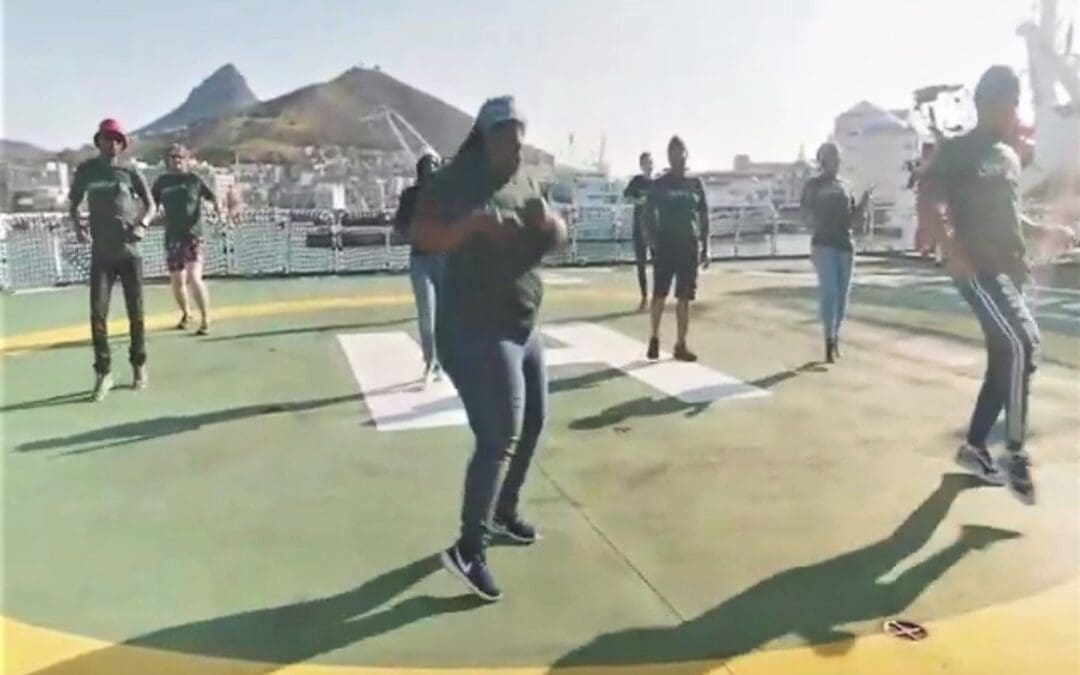

 Gough Island is located at 40°S, 9°W – 2600 km from East Pier, Cape Town Harbour. (Image above by Christopher Jones currently onthe Island) South Africa has been operating a weather station on Gough Island since 1956. The first overwintering team consists of 4 members , but since then the team structure has developed to include more members. The team consists of a Medical Orderly, Diesel Mechanic, Electrical Engineer and a Communications Engineer. The South African Weather Service(SAWS send a team that consist of a Senior Meteorological Technician and two Meteorological Technicians. The rest of the team is made up of 3 Field assistants of the Royal Society for the Protection of Birds(RSPB). A team leader and deputy team leader are also appointed for the duration of their time.
Gough Island is located at 40°S, 9°W – 2600 km from East Pier, Cape Town Harbour. (Image above by Christopher Jones currently onthe Island) South Africa has been operating a weather station on Gough Island since 1956. The first overwintering team consists of 4 members , but since then the team structure has developed to include more members. The team consists of a Medical Orderly, Diesel Mechanic, Electrical Engineer and a Communications Engineer. The South African Weather Service(SAWS send a team that consist of a Senior Meteorological Technician and two Meteorological Technicians. The rest of the team is made up of 3 Field assistants of the Royal Society for the Protection of Birds(RSPB). A team leader and deputy team leader are also appointed for the duration of their time.
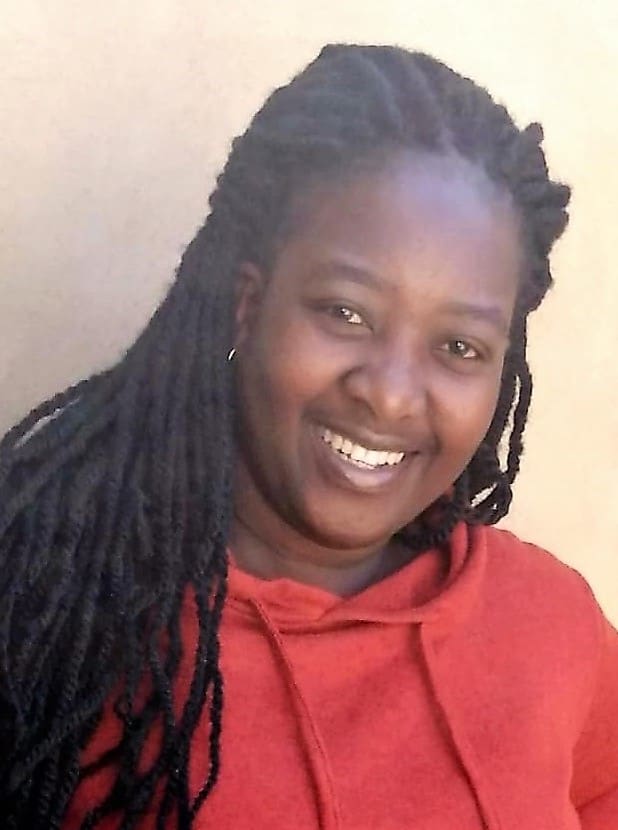
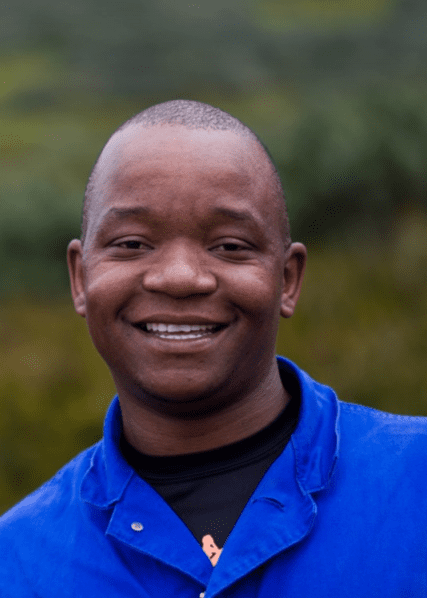
 (Above L-R: Tshimangadzo Jufter(Jay) Munyai – Leader and Electrical Engineer, Catherine(Cathy) Mbazwana – Deputy Leader and Medical Orderly, S’Celo Ndwalane – Diesel Mechanic and Gert Benadé – Communications Engineer)
(Above L-R: Tshimangadzo Jufter(Jay) Munyai – Leader and Electrical Engineer, Catherine(Cathy) Mbazwana – Deputy Leader and Medical Orderly, S’Celo Ndwalane – Diesel Mechanic and Gert Benadé – Communications Engineer)

 (Above L-R: Zinhle(Zee) Shongwe – Senior Meteorological Technician and Meteorological Technicians (Asa) Somaxaka and Dylan Seaton (of Gough65 staying on for another year)
(Above L-R: Zinhle(Zee) Shongwe – Senior Meteorological Technician and Meteorological Technicians (Asa) Somaxaka and Dylan Seaton (of Gough65 staying on for another year)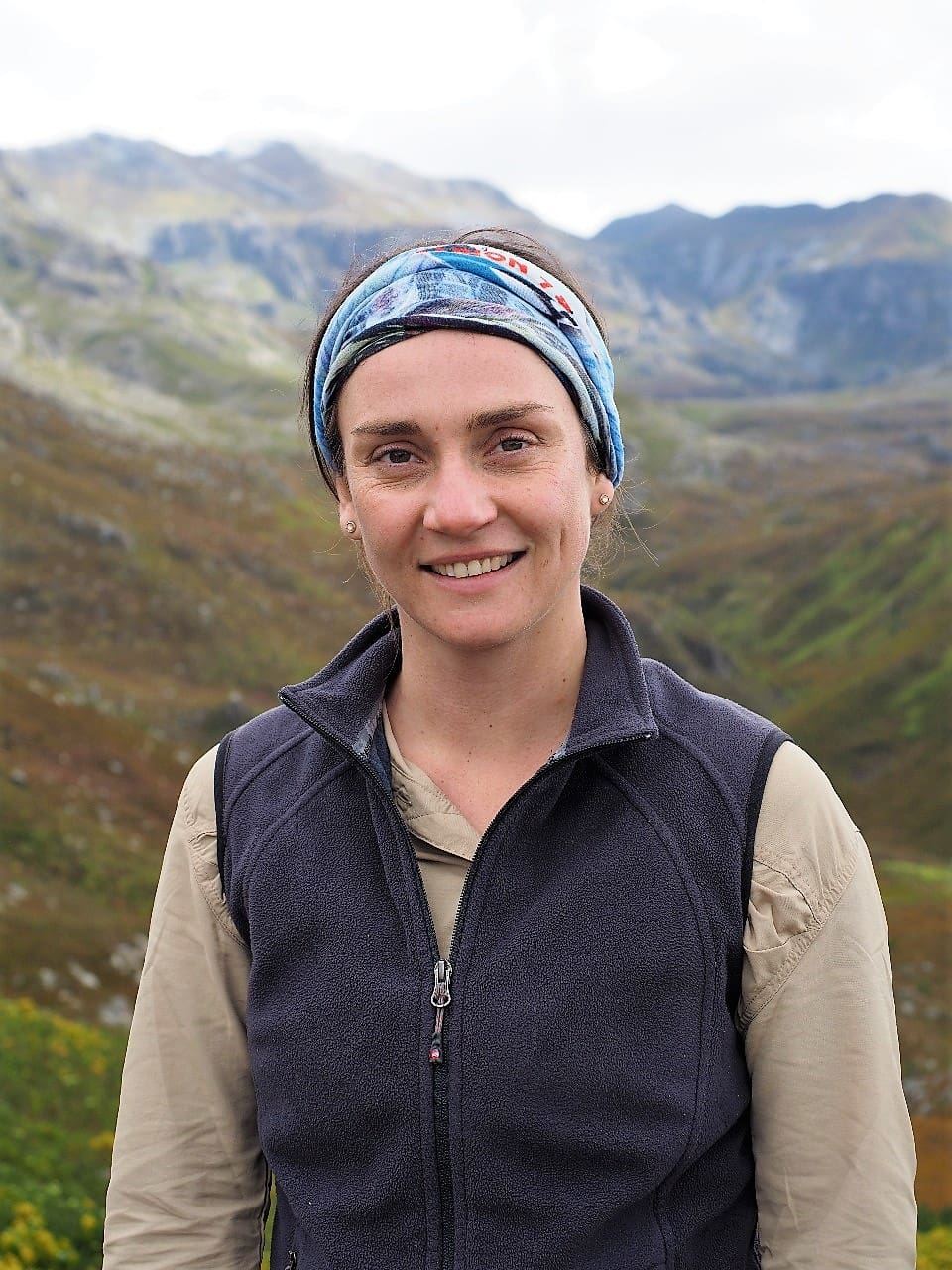

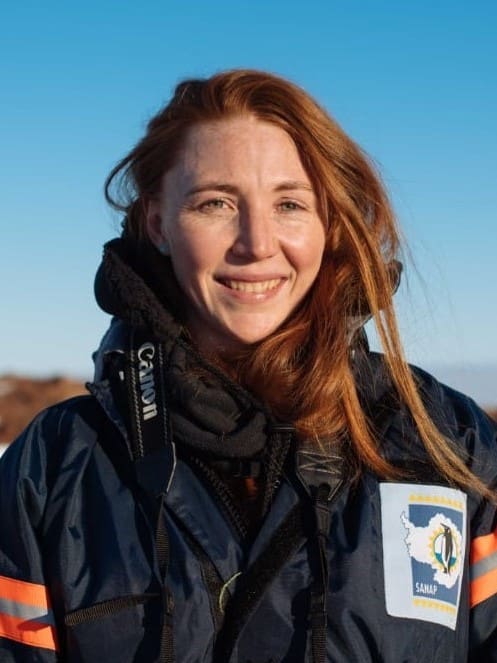 (Above L-R: RSPB field assistants; Vonica Perold, Roelf Daling and Kim Stevens
(Above L-R: RSPB field assistants; Vonica Perold, Roelf Daling and Kim Stevens As with Marion77 overwintering team the 2020 annual S.A. Agulhas II relief voyage to Gough Island departed on 19 September 2020 under strict Covid-19 health protocols. In the midst of these protocols and given the clear the Gough 66 made time to be part of South Africa Heritage Celebrations and answered the call by President Ramaphosa and create a video of the #JeruslaemDanceChallenge (have a look on Facebook). Gough will stop at Tristan de Cunha on the way to Gough Island and then Gough 66 will take-over form Gough65
As with Marion77 overwintering team the 2020 annual S.A. Agulhas II relief voyage to Gough Island departed on 19 September 2020 under strict Covid-19 health protocols. In the midst of these protocols and given the clear the Gough 66 made time to be part of South Africa Heritage Celebrations and answered the call by President Ramaphosa and create a video of the #JeruslaemDanceChallenge (have a look on Facebook). Gough will stop at Tristan de Cunha on the way to Gough Island and then Gough 66 will take-over form Gough65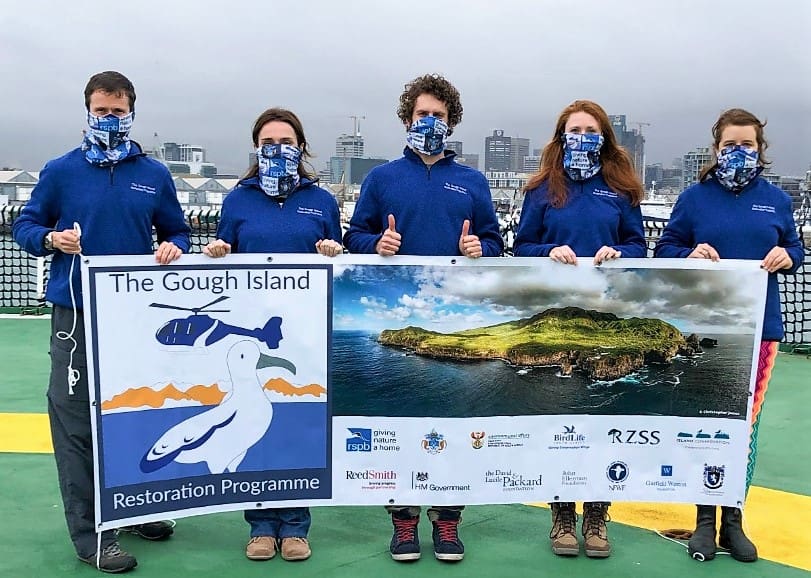 (Above L-R: Richard Hall – Logistics Manager, Vonica Perold, Roelf Daling and Kim Stevens – RSPB Field Asisstants and Nini van der Merwe(BirdlifeSA) with poster of restoration programme. The Gough Island Restoration 2021 also gets underway with the departure of Gough 66. RSPB;” Six months after having made the devastating decision to postpone the 2020 restoration of Gough Island, our team is back in strength and starting to gear up for what we hope will be a 2021 mouse eradication attempt.”
(Above L-R: Richard Hall – Logistics Manager, Vonica Perold, Roelf Daling and Kim Stevens – RSPB Field Asisstants and Nini van der Merwe(BirdlifeSA) with poster of restoration programme. The Gough Island Restoration 2021 also gets underway with the departure of Gough 66. RSPB;” Six months after having made the devastating decision to postpone the 2020 restoration of Gough Island, our team is back in strength and starting to gear up for what we hope will be a 2021 mouse eradication attempt.”

 Above a few preliminary team photos (L-R: girls of 66, Team66, Guys of 66) Follow #GOUGH66 on Twitter @Antarcticlegacy and Facebook
Above a few preliminary team photos (L-R: girls of 66, Team66, Guys of 66) Follow #GOUGH66 on Twitter @Antarcticlegacy and Facebook 

 Department of Environment Forestry and Fisheries : Media Statement – 15 September 2020 : SA Agulhas II will depart for Gough Island under strict health protocols:
Department of Environment Forestry and Fisheries : Media Statement – 15 September 2020 : SA Agulhas II will depart for Gough Island under strict health protocols: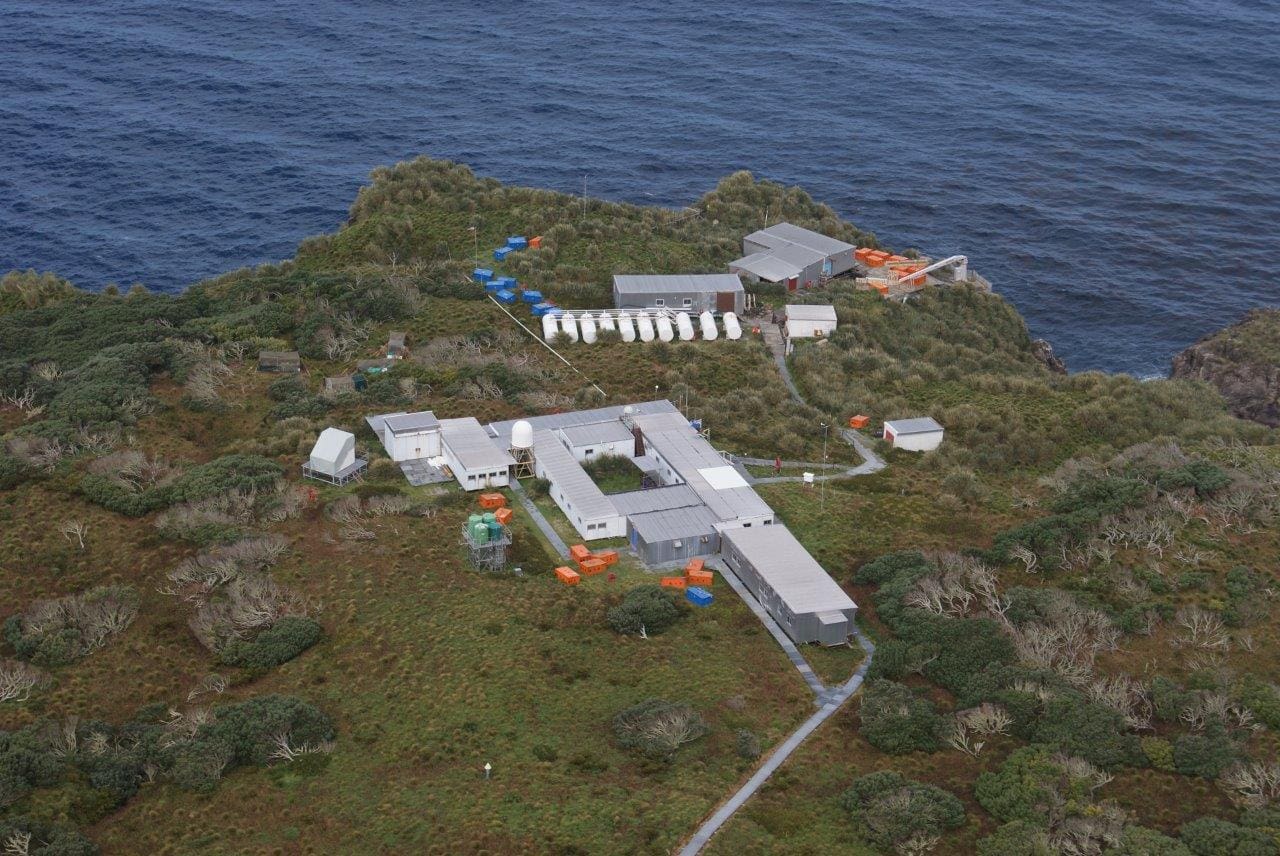 Gough Island, some 2600 km south-west of Cape Town, is very strategic for South Africa’s weather observations and forecasting. The weather data collected at Gough and Marion Islands and at SANAE IV on Antarctica, is important for the navigation of passing vessels, warning South Africa of impending severe weather systems (in the case of Gough Island), as well as providing insight into climate change. These datasets are also key to improving the accuracy of our global and regional weather forecast models.
Gough Island, some 2600 km south-west of Cape Town, is very strategic for South Africa’s weather observations and forecasting. The weather data collected at Gough and Marion Islands and at SANAE IV on Antarctica, is important for the navigation of passing vessels, warning South Africa of impending severe weather systems (in the case of Gough Island), as well as providing insight into climate change. These datasets are also key to improving the accuracy of our global and regional weather forecast models.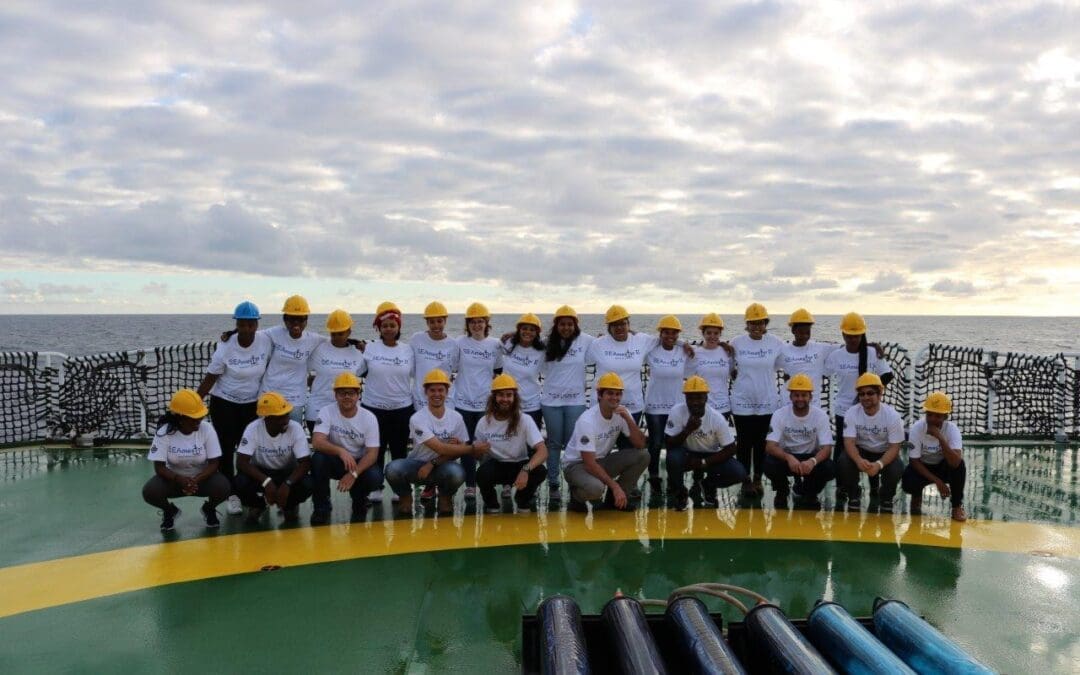
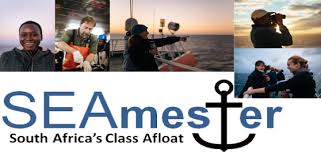

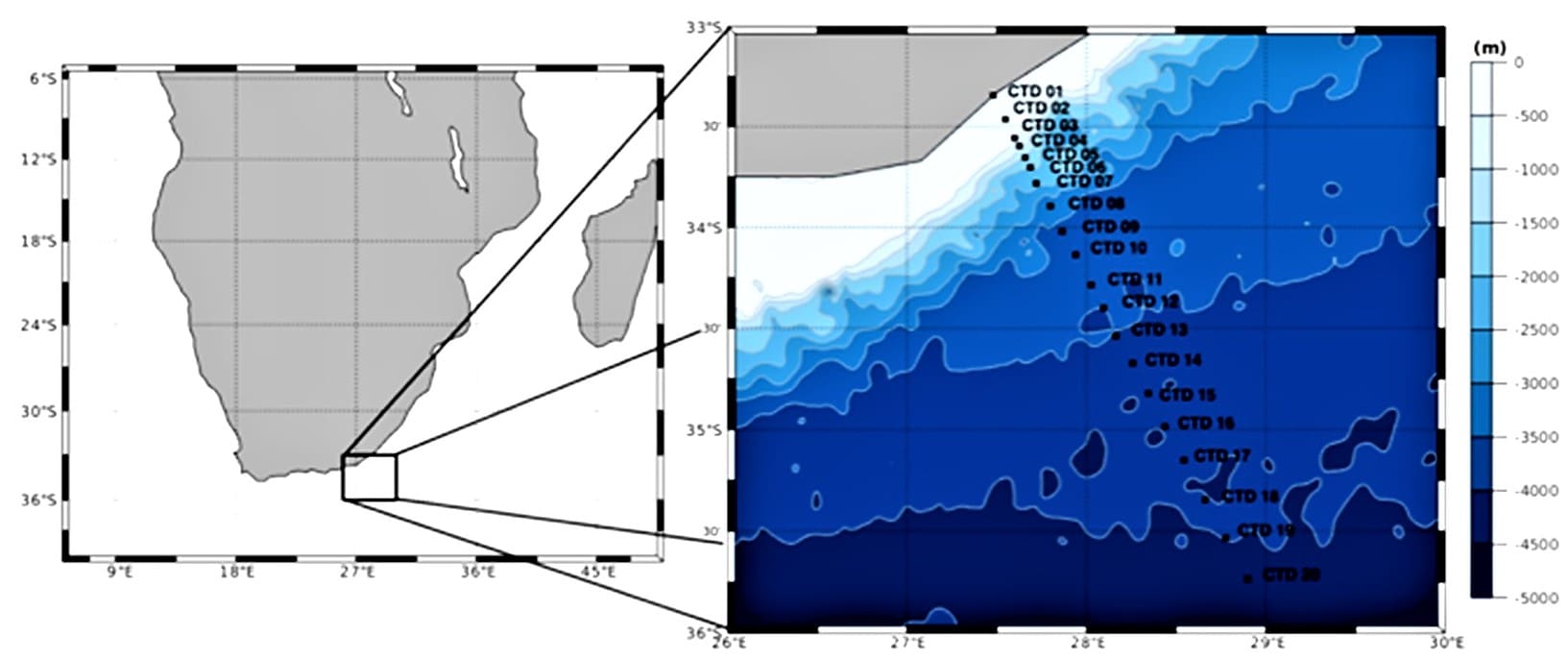 3 of the 4 previous SEAmester cruises have sampled the Agulhas System Climate Array (ASCA) transect. ASCA was an array of moorings deployed across the Agulhas Current from April 2016 to May 2018, in order to better understand the physical properties and dynamics of the Agulhas Current. The ASCA project extended the research undertaken along this array during the Agulhas Current Time-series project by continuing to sample the same 20 hydrographic stations. In-situ data in the Agulhas Current is very rare, and the collaborative, multi-disciplinary approach adopted during SEAmester has greatly improved our understanding of the complex Agulhas Current System. More information in paper by
3 of the 4 previous SEAmester cruises have sampled the Agulhas System Climate Array (ASCA) transect. ASCA was an array of moorings deployed across the Agulhas Current from April 2016 to May 2018, in order to better understand the physical properties and dynamics of the Agulhas Current. The ASCA project extended the research undertaken along this array during the Agulhas Current Time-series project by continuing to sample the same 20 hydrographic stations. In-situ data in the Agulhas Current is very rare, and the collaborative, multi-disciplinary approach adopted during SEAmester has greatly improved our understanding of the complex Agulhas Current System. More information in paper by 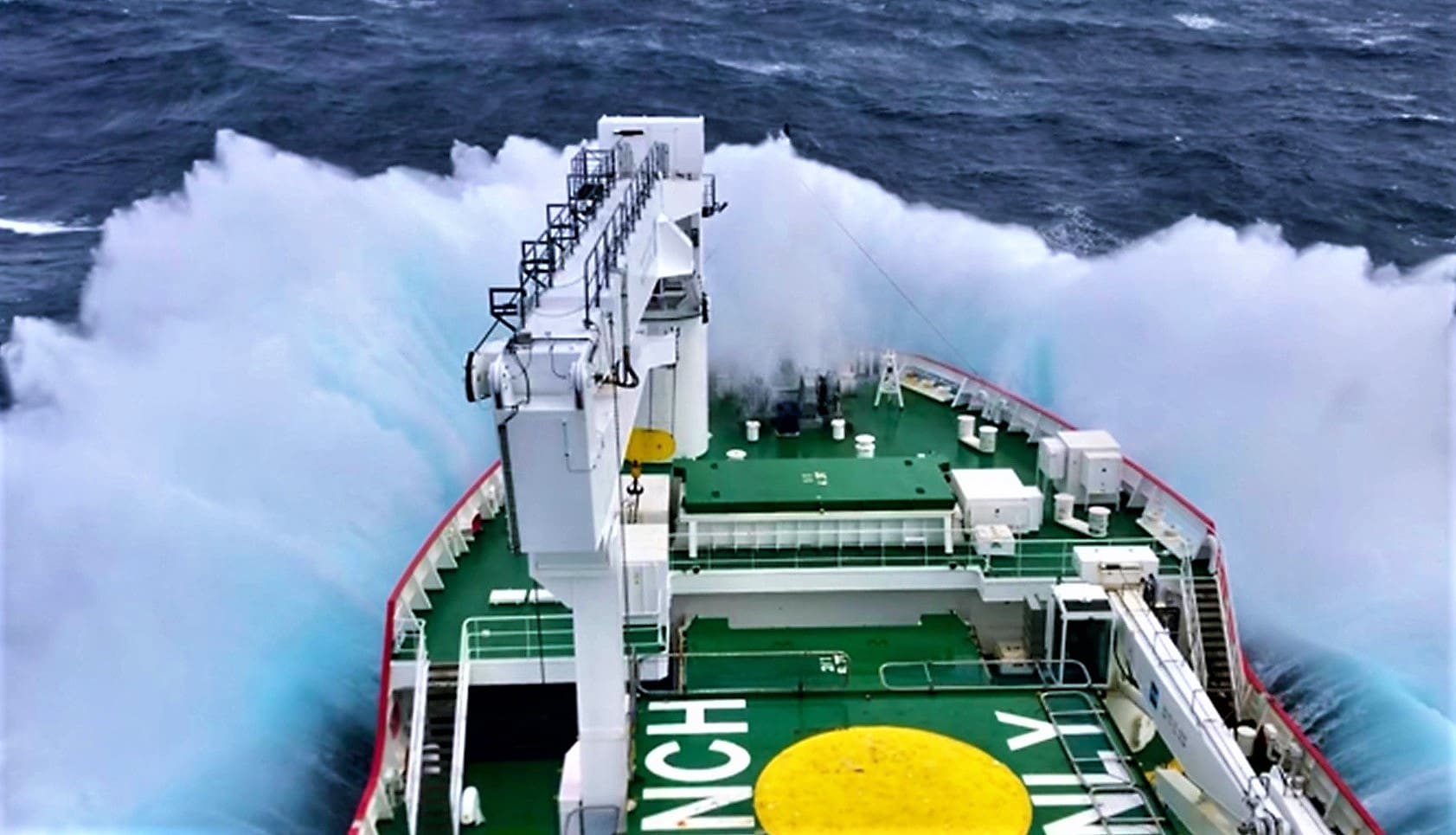 Left: Last year during SEAmester IV we experienced 3 consecutive cold fronts with resulting waves of up to 10m in size. This rough weather meant we were only able to sample 16 out of 20 of our planned stations. Photo credit: Thando Mazomba
Left: Last year during SEAmester IV we experienced 3 consecutive cold fronts with resulting waves of up to 10m in size. This rough weather meant we were only able to sample 16 out of 20 of our planned stations. Photo credit: Thando Mazomba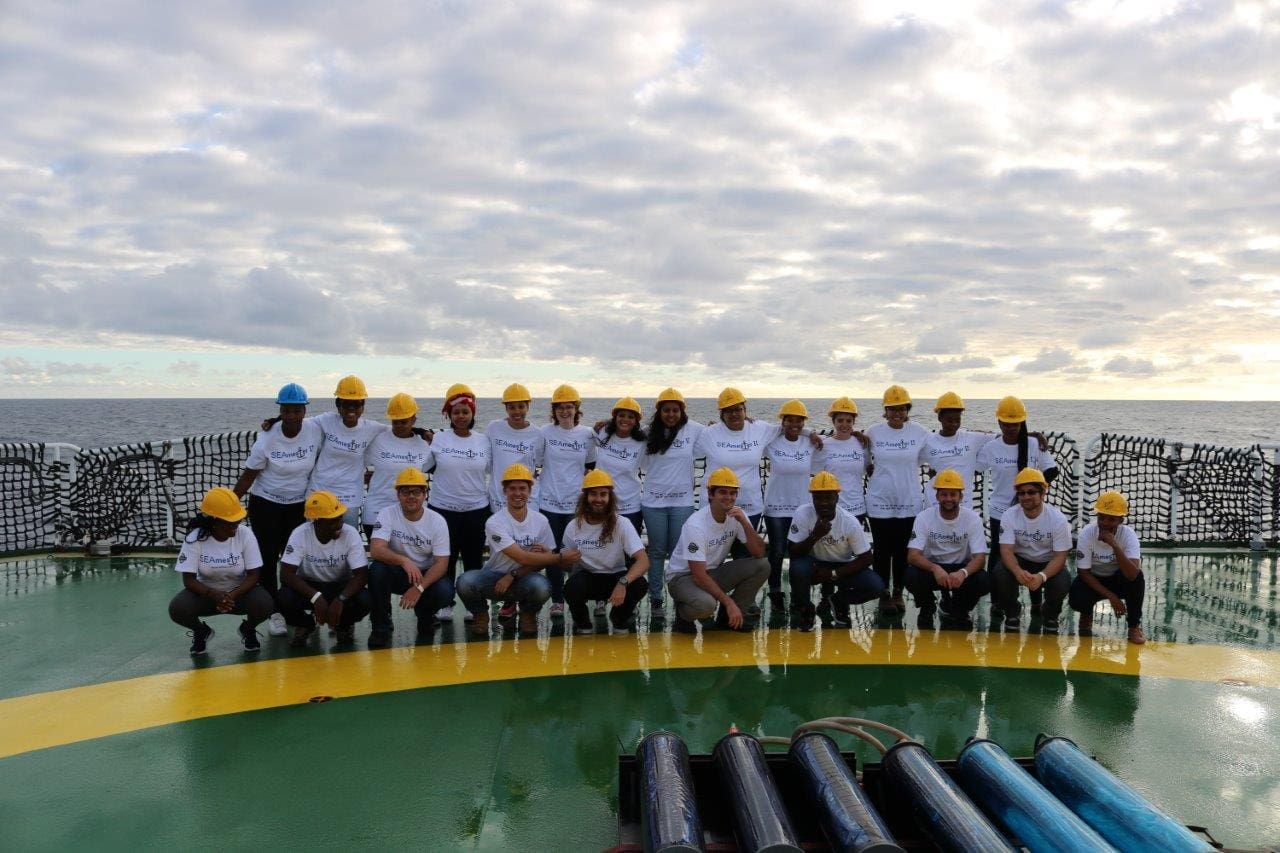 SEAmester has changed the lives of students! “
SEAmester has changed the lives of students! “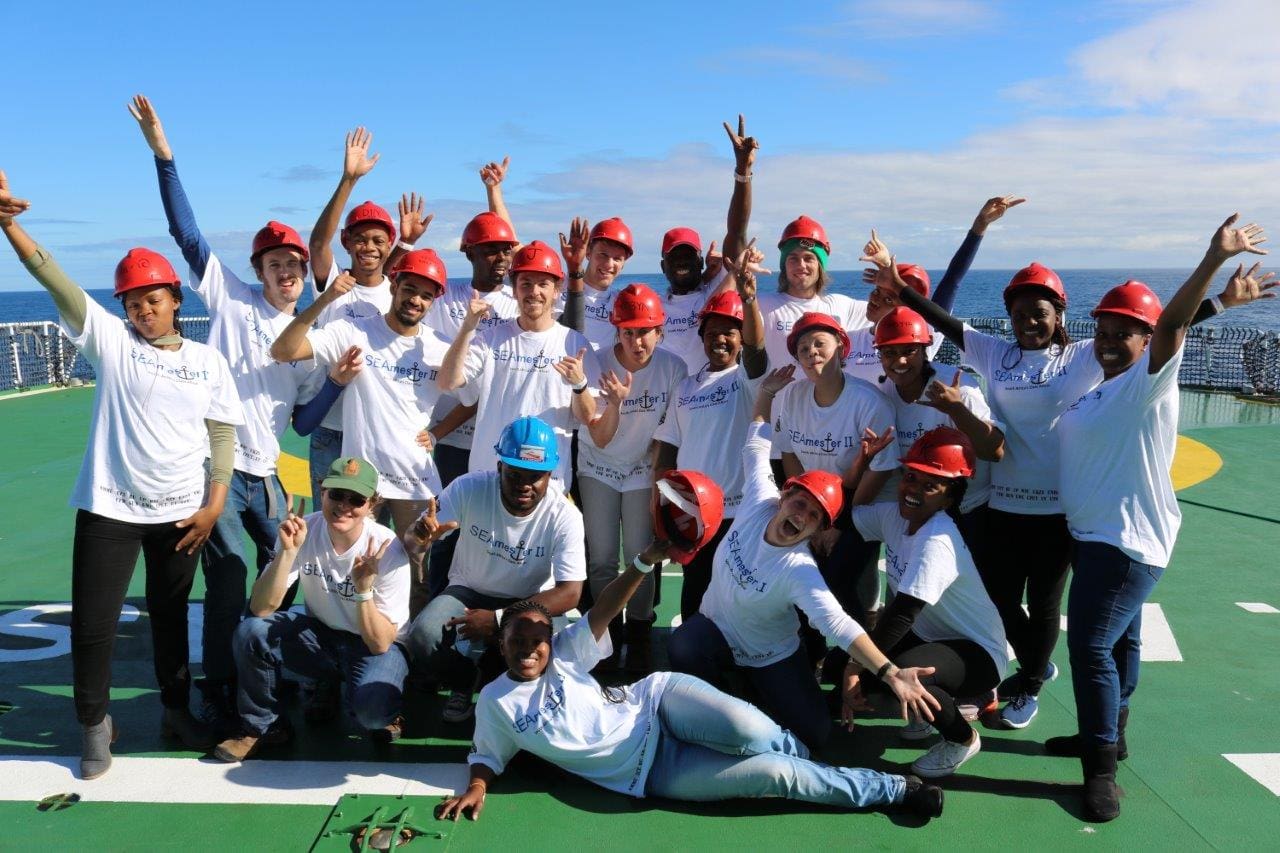
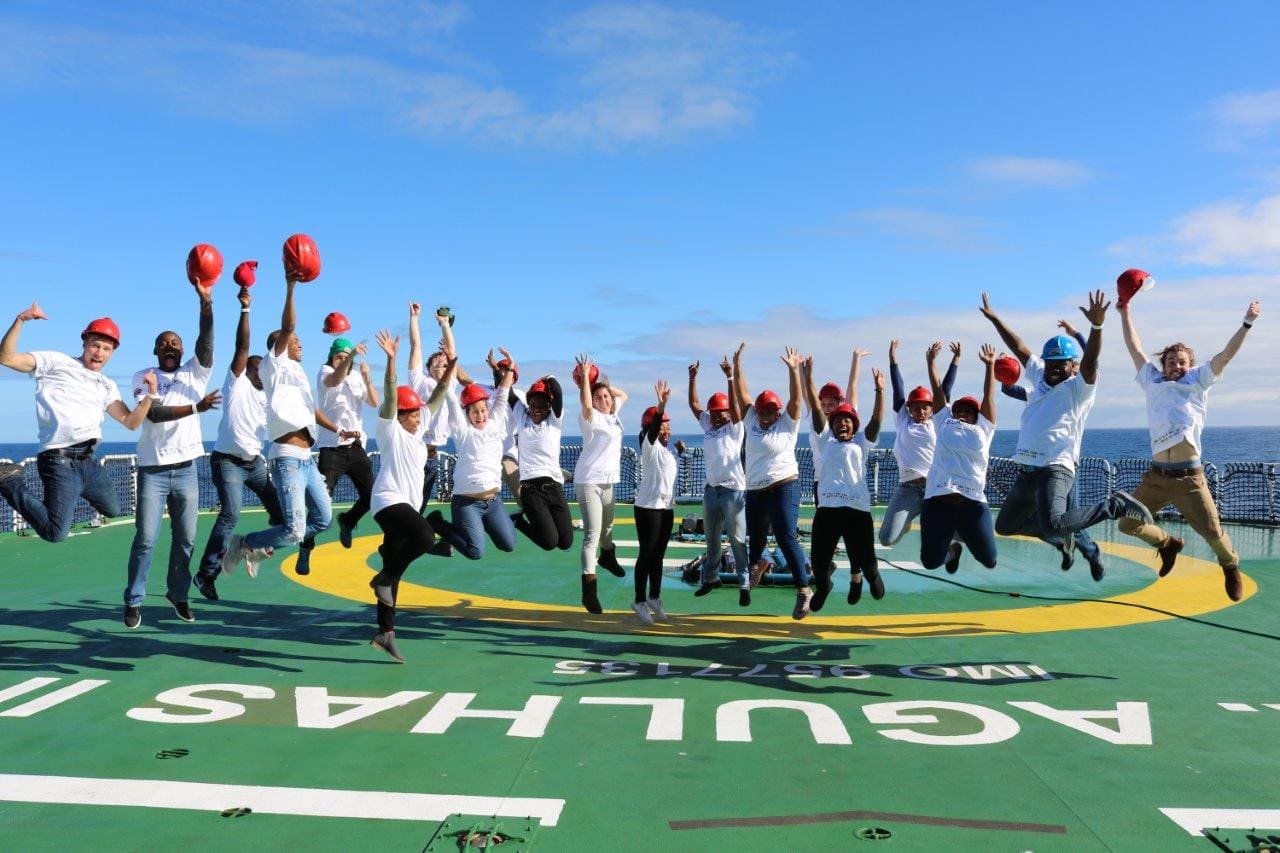 Text Supplied by Laura Braby – SAEON- Egagasini Node. Student Comments supplied by Isabelle Ansorge. Images available on
Text Supplied by Laura Braby – SAEON- Egagasini Node. Student Comments supplied by Isabelle Ansorge. Images available on 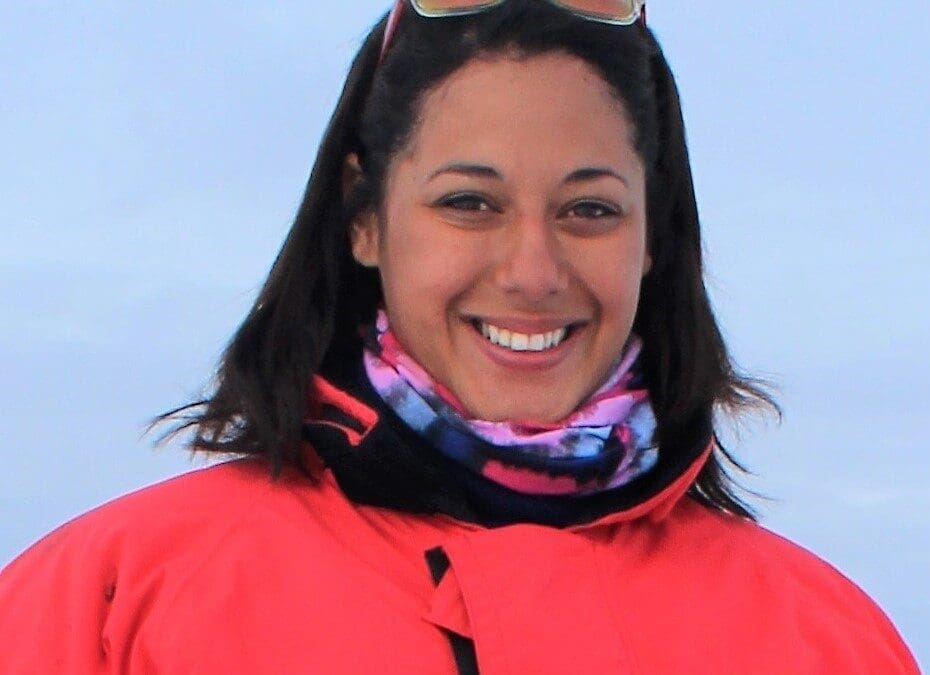
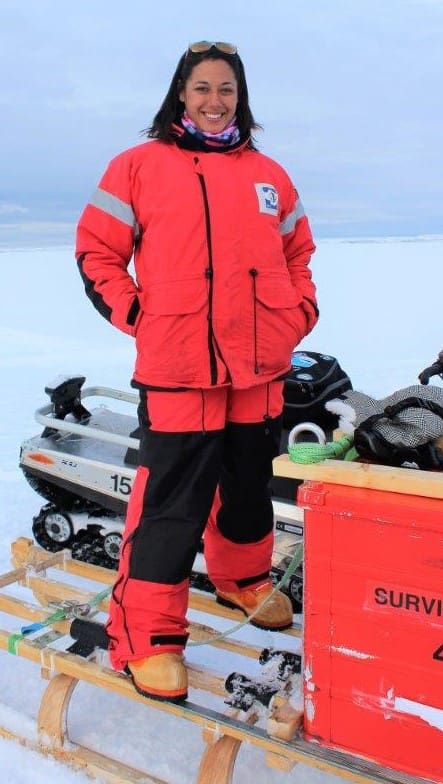 Where did it all started for Tahlia: “From an early age I have had an unbridled passion for the ocean and understanding technology, which led me to pursue my studies in Oceanography at the Cape Peninsula University of Technology (CPUT). I chose to study here as it provided a platform to not only gain academic experience within an oceanographic context, but to also gain field experience. In my third year (2014) I was placed at Bayworld Centre of Research and Education (BCRE) in order to complete a number of research projects which spanned across an array of oceanographic disciplines, namely: Marine Instrumentation, Marine Resource Management, Ocean Sciences and Marine Outreach. This placement exposed me to the different aspects of oceanography and allowed me to find my particular field of interest. It was there, at BCRE, that I was exposed to physical oceanography, data processing and development of marine instrumentation. I knew that I had found my niche within the oceanographic community and would strive to further my education, work experience and continue to learn and grow within this sector. After earning a National Diploma, I completed a BTech degree where I continued to work part-time at BCRE and develop my final research project. This project focused on the development of two sub-sea moorings, each housing a 75 kHz Acoustic Doppler Current Profiler (ADCP), which I was fortunate enough to deploy between two sub-Antarctic Islands—Marion Island and Prince Edward Island—while aboard the research vessel, SA Agulhas II.
Where did it all started for Tahlia: “From an early age I have had an unbridled passion for the ocean and understanding technology, which led me to pursue my studies in Oceanography at the Cape Peninsula University of Technology (CPUT). I chose to study here as it provided a platform to not only gain academic experience within an oceanographic context, but to also gain field experience. In my third year (2014) I was placed at Bayworld Centre of Research and Education (BCRE) in order to complete a number of research projects which spanned across an array of oceanographic disciplines, namely: Marine Instrumentation, Marine Resource Management, Ocean Sciences and Marine Outreach. This placement exposed me to the different aspects of oceanography and allowed me to find my particular field of interest. It was there, at BCRE, that I was exposed to physical oceanography, data processing and development of marine instrumentation. I knew that I had found my niche within the oceanographic community and would strive to further my education, work experience and continue to learn and grow within this sector. After earning a National Diploma, I completed a BTech degree where I continued to work part-time at BCRE and develop my final research project. This project focused on the development of two sub-sea moorings, each housing a 75 kHz Acoustic Doppler Current Profiler (ADCP), which I was fortunate enough to deploy between two sub-Antarctic Islands—Marion Island and Prince Edward Island—while aboard the research vessel, SA Agulhas II.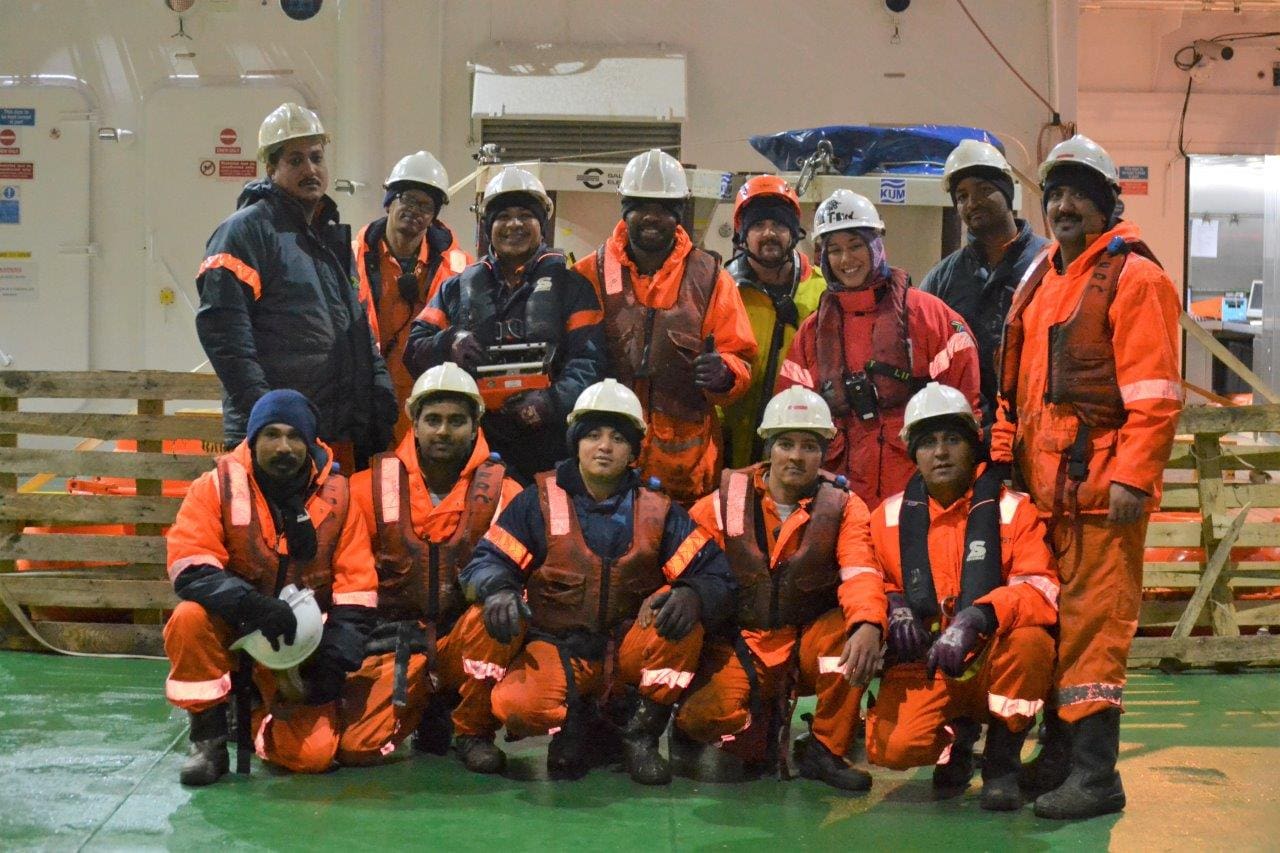
 Following the completion of my BTech degree, I continued to work on this mooring data over the next four years, returning to Marion Island and ensuring the safe retrieval and re-deployment of the sub-sea moorings. The data collected formulated the basis of my MSc research project, entitled Impact of ocean variability on Shelf-Seas surrounding the sub-Antarctic Prince Edward Islands.
Following the completion of my BTech degree, I continued to work on this mooring data over the next four years, returning to Marion Island and ensuring the safe retrieval and re-deployment of the sub-sea moorings. The data collected formulated the basis of my MSc research project, entitled Impact of ocean variability on Shelf-Seas surrounding the sub-Antarctic Prince Edward Islands.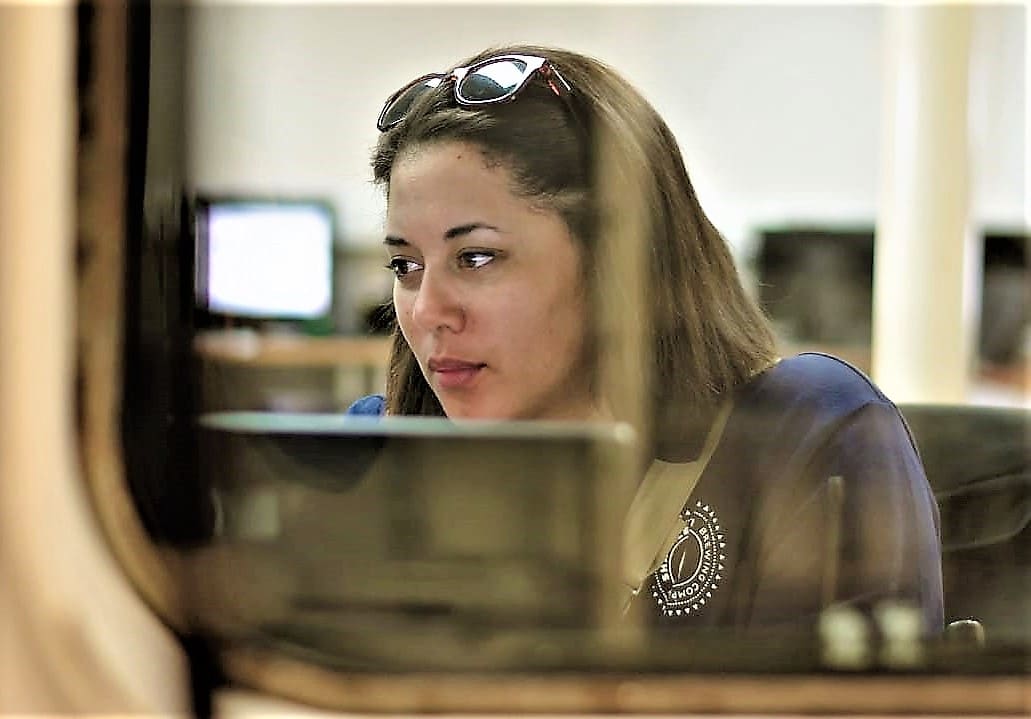
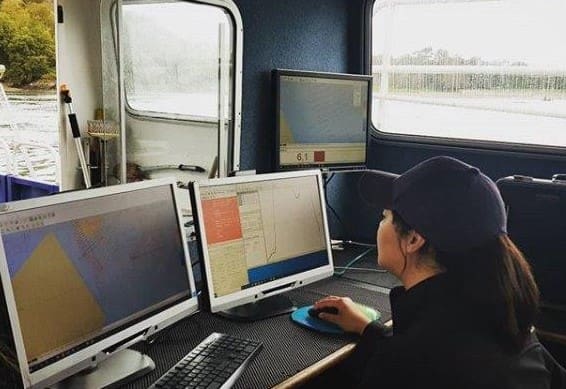
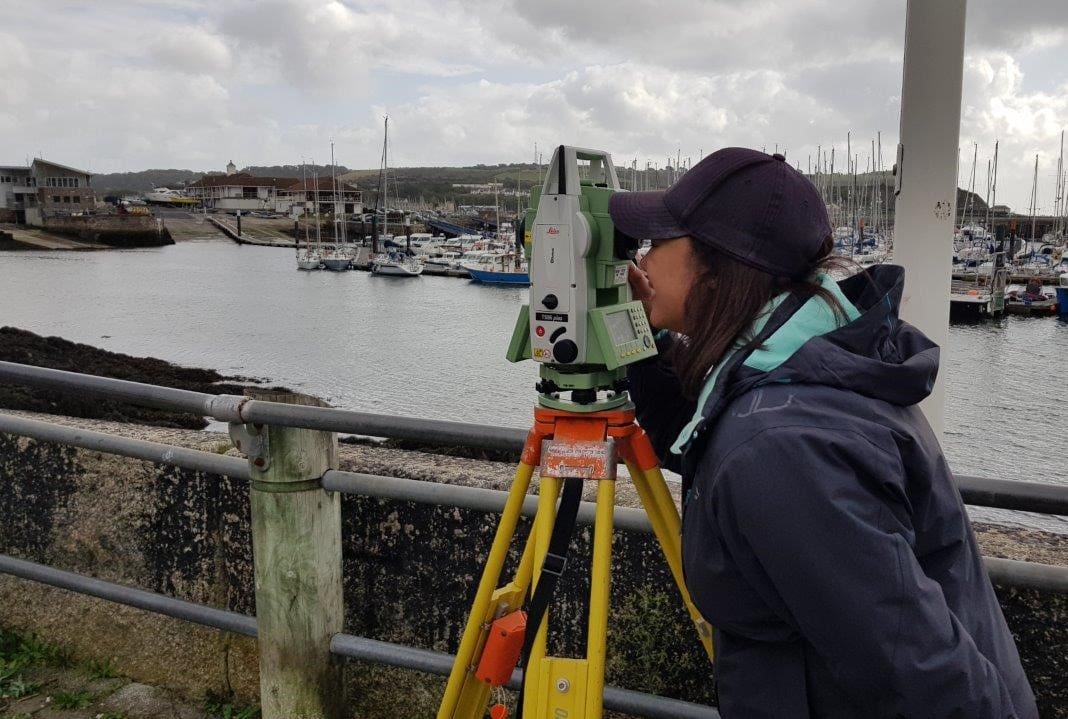 More recently I have been exposed to the commercial oceanographic industry by working as a marine technician for Lwandle Marine Technologies. Albeit a brief time spent with Lwandle, I have experienced a very different aspect of oceanography in practice. I worked on a variety of contracts utilising skills I’ve gained over the years such as commercial diving operations, in situ data collection and hands-on instrumentation repairs/maintenance. These contracts also opened the door to innovative ways of thinking, problem solving and team work. I was also involved in equipment sales, field trip logistics and ‘meet and greets’ with clients which have been a great learning opportunity.
More recently I have been exposed to the commercial oceanographic industry by working as a marine technician for Lwandle Marine Technologies. Albeit a brief time spent with Lwandle, I have experienced a very different aspect of oceanography in practice. I worked on a variety of contracts utilising skills I’ve gained over the years such as commercial diving operations, in situ data collection and hands-on instrumentation repairs/maintenance. These contracts also opened the door to innovative ways of thinking, problem solving and team work. I was also involved in equipment sales, field trip logistics and ‘meet and greets’ with clients which have been a great learning opportunity.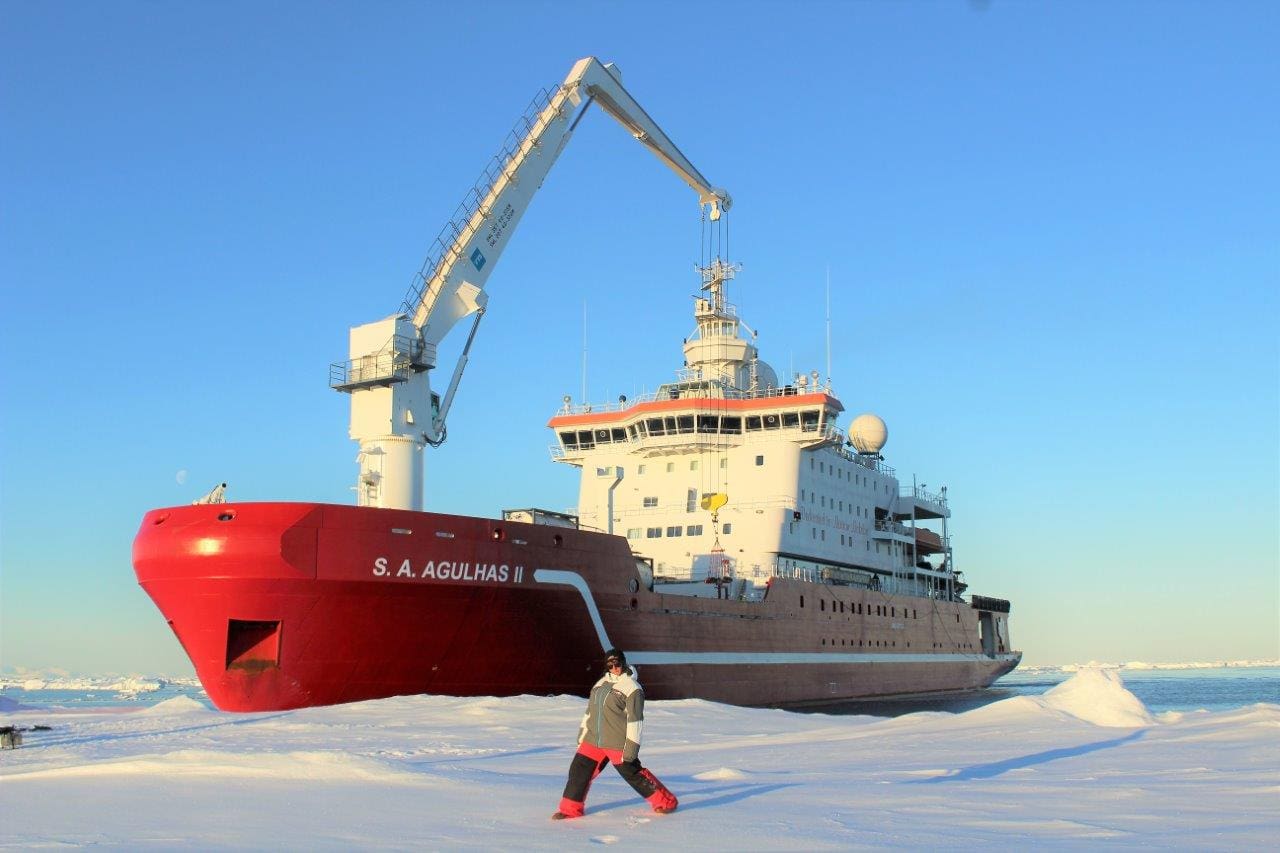
 In December 2018 I was hired by the
In December 2018 I was hired by the 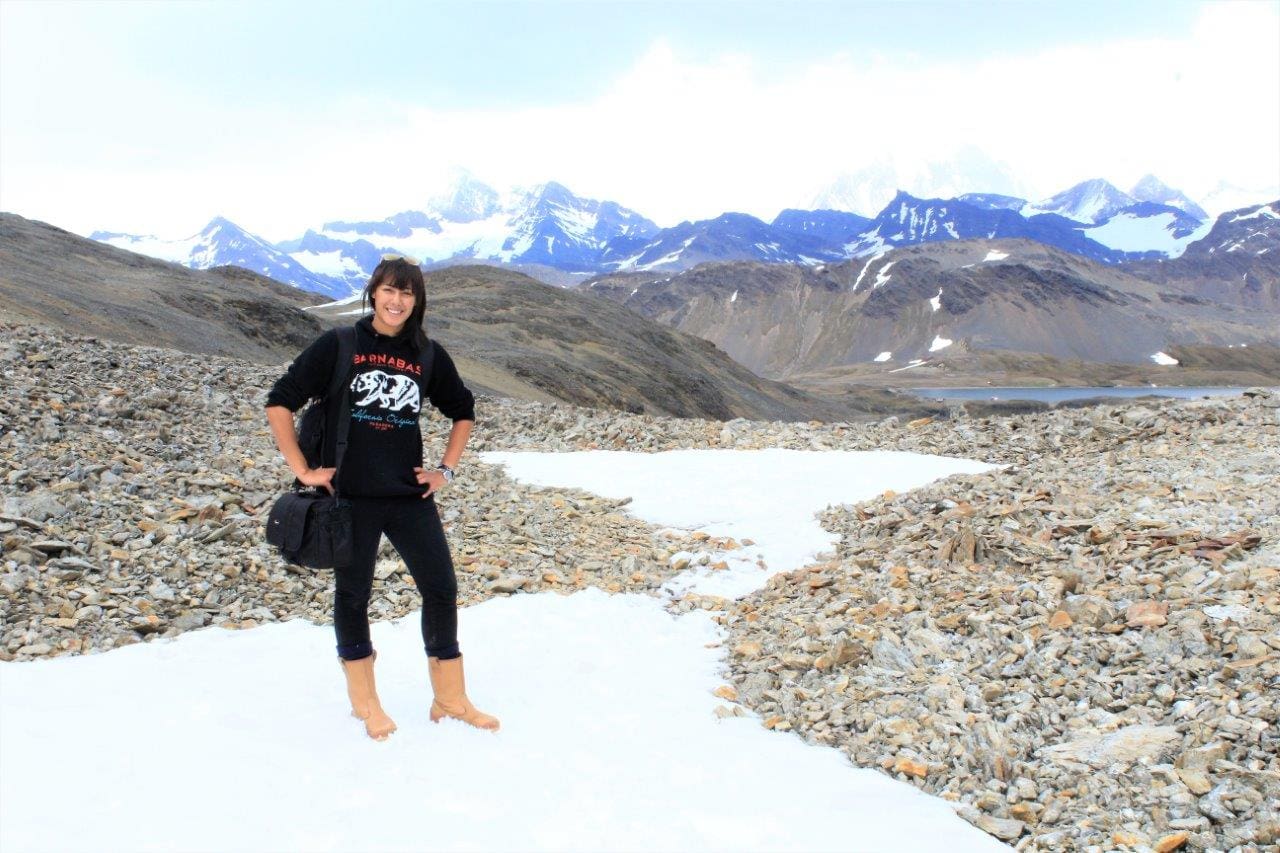 I love my career as it is ever changing and growing with the current climate or latest technological advances. I have been able to see the world, visit remote and beautiful locations, sail the high seas and build incredible bonds with fellow scientists. It isn’t always an easy journey, but conquering the challenge of this lifestyle and career choice is what makes it worthwhile. The sense of adventure is never ending and I’m always learning along the way. Madame Curie once said that nothing in life is to be fear but rather understood, so that we understand more and fear less. I think this gives us a great sense of pride in what we do and to strive to be curious about our world, to best understand, preserve it and pass the torch on to future generations.
I love my career as it is ever changing and growing with the current climate or latest technological advances. I have been able to see the world, visit remote and beautiful locations, sail the high seas and build incredible bonds with fellow scientists. It isn’t always an easy journey, but conquering the challenge of this lifestyle and career choice is what makes it worthwhile. The sense of adventure is never ending and I’m always learning along the way. Madame Curie once said that nothing in life is to be fear but rather understood, so that we understand more and fear less. I think this gives us a great sense of pride in what we do and to strive to be curious about our world, to best understand, preserve it and pass the torch on to future generations.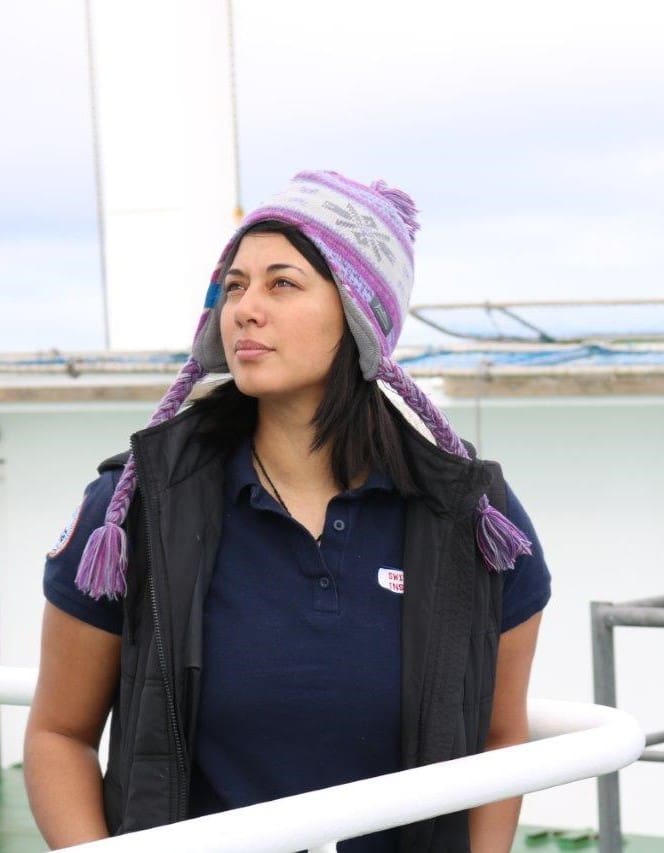 To future researchers, be diligent, work hard and persevere throughout your career. There will be challenging days but there will also be days that out shadow the challenges and fuel your passion for science. Always be teachable no matter your age, and always willing to learn and lend a hand to your fellow scientists. The work you do throughout your career will not only impact and improve your life but will pave the way for those coming up behind you. So take pride in what your work, rise up to the challenges and enjoy the journey! (Right: Photo credit:Alexander Oelofse during SEAmester)
To future researchers, be diligent, work hard and persevere throughout your career. There will be challenging days but there will also be days that out shadow the challenges and fuel your passion for science. Always be teachable no matter your age, and always willing to learn and lend a hand to your fellow scientists. The work you do throughout your career will not only impact and improve your life but will pave the way for those coming up behind you. So take pride in what your work, rise up to the challenges and enjoy the journey! (Right: Photo credit:Alexander Oelofse during SEAmester)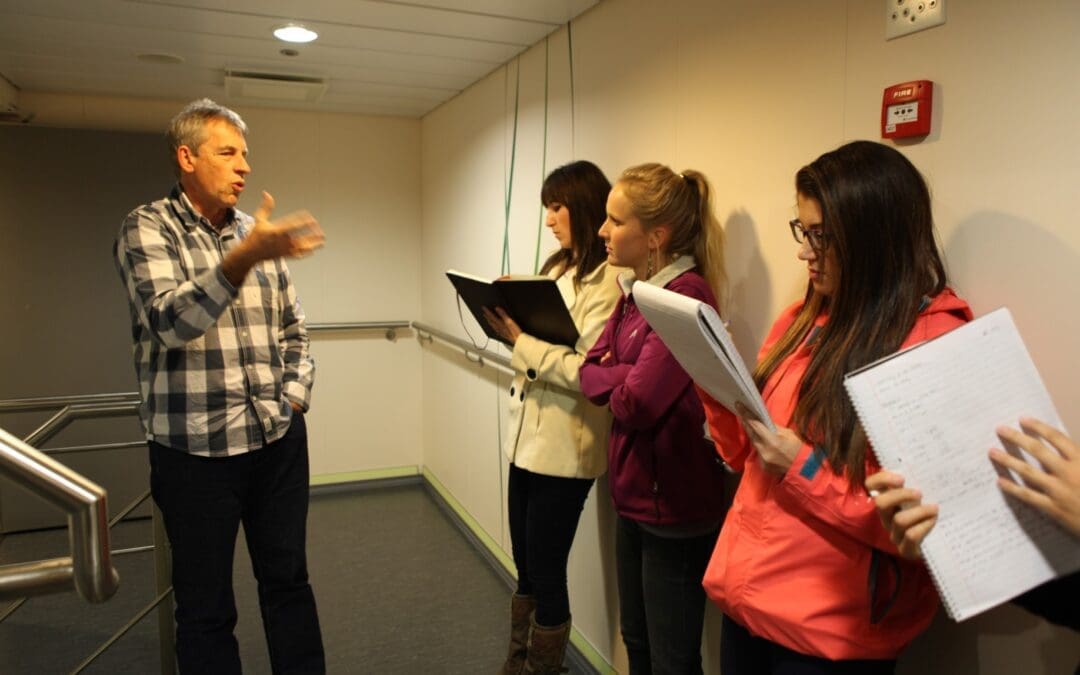
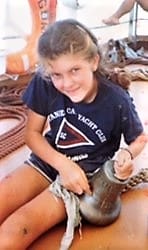
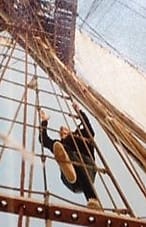
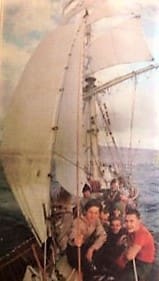
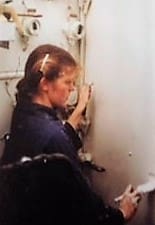 Isabelle as a child always wanted to be an oceanographer. “When I was 13 my father sent me off for 6 months on a Tall Ship to sail around Africa. And so, having grown up on sailing ships and sailing the world at a very young age it seemed only natural to follow in my passion to build a career around the sea.
Isabelle as a child always wanted to be an oceanographer. “When I was 13 my father sent me off for 6 months on a Tall Ship to sail around Africa. And so, having grown up on sailing ships and sailing the world at a very young age it seemed only natural to follow in my passion to build a career around the sea.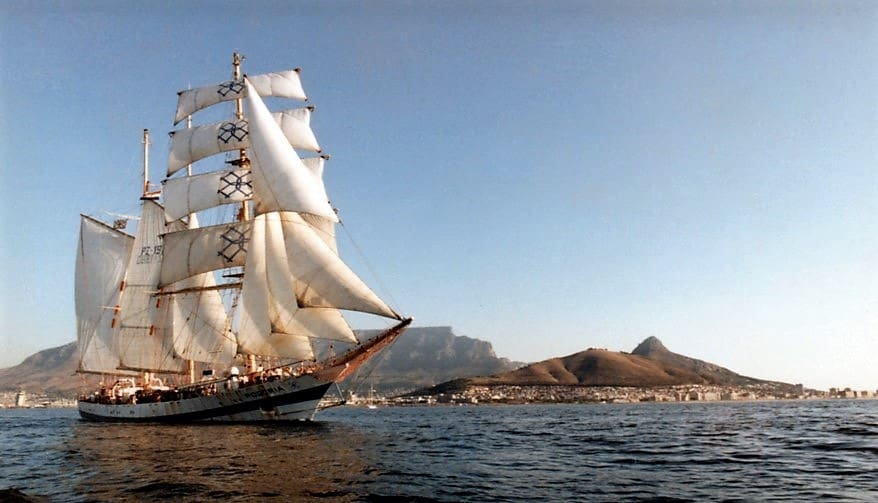
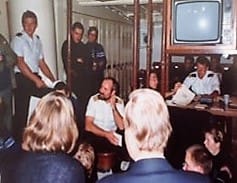
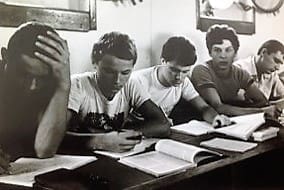 I first studied at
I first studied at 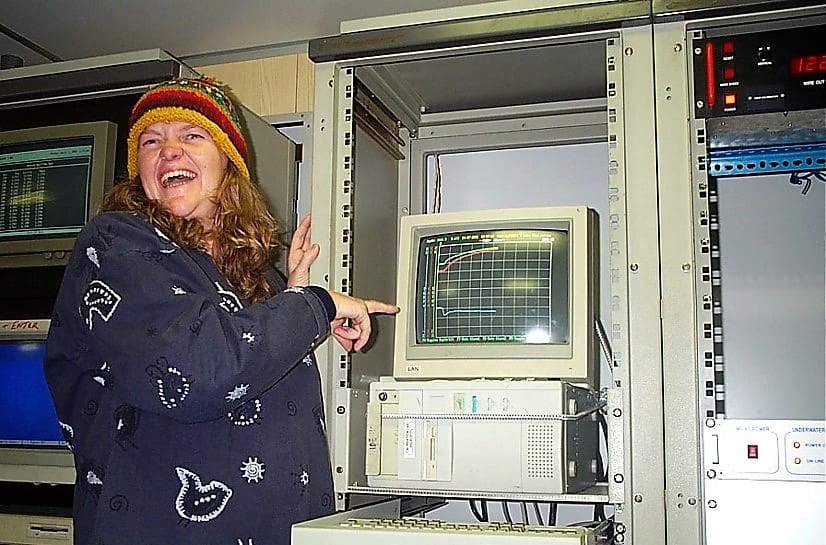
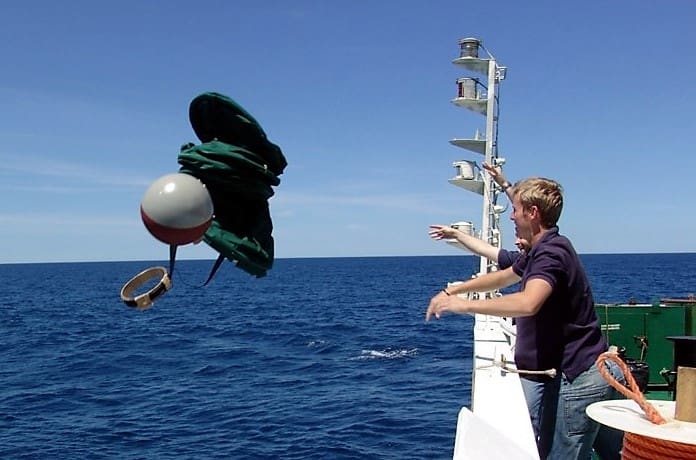
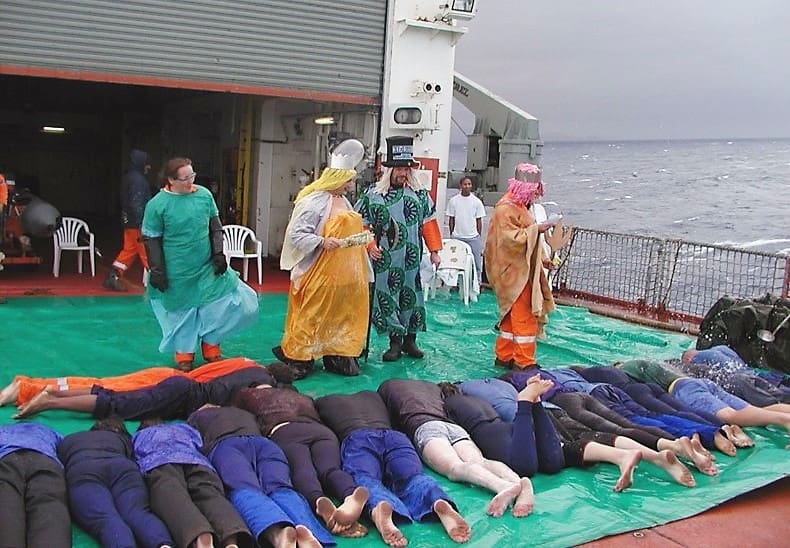 One of my first jobs at
One of my first jobs at 
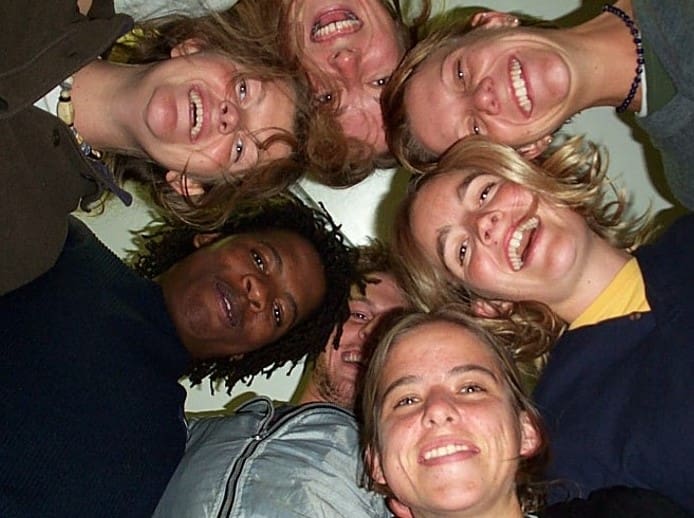 Isabelle’s Working Life: “I was employed as a lecturer at UCT in 2006 and have worked hard to build a career both nationally and internationally in observational oceanography. My passion and love for the sea can be seen in the many opportunities that I create for students both at UCT, and as can be seen from the
Isabelle’s Working Life: “I was employed as a lecturer at UCT in 2006 and have worked hard to build a career both nationally and internationally in observational oceanography. My passion and love for the sea can be seen in the many opportunities that I create for students both at UCT, and as can be seen from the 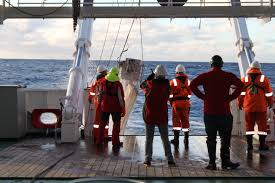
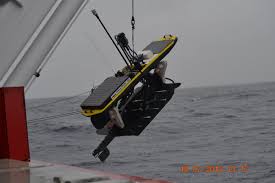
 What drives me:” I love teaching students. Taking a student to sea and watching them learn and seeing their eyes light up when they first board the SA Agulhas II is extremely rewarding. Many of my former students have returned to sea either as senior researchers leading their own cohort of students, or they have built their career in marine management or moved into the academic field. It is so rewarding see young inexperienced students join a cruise and leave imbued with a new confidence and a passion for their discipline.
What drives me:” I love teaching students. Taking a student to sea and watching them learn and seeing their eyes light up when they first board the SA Agulhas II is extremely rewarding. Many of my former students have returned to sea either as senior researchers leading their own cohort of students, or they have built their career in marine management or moved into the academic field. It is so rewarding see young inexperienced students join a cruise and leave imbued with a new confidence and a passion for their discipline.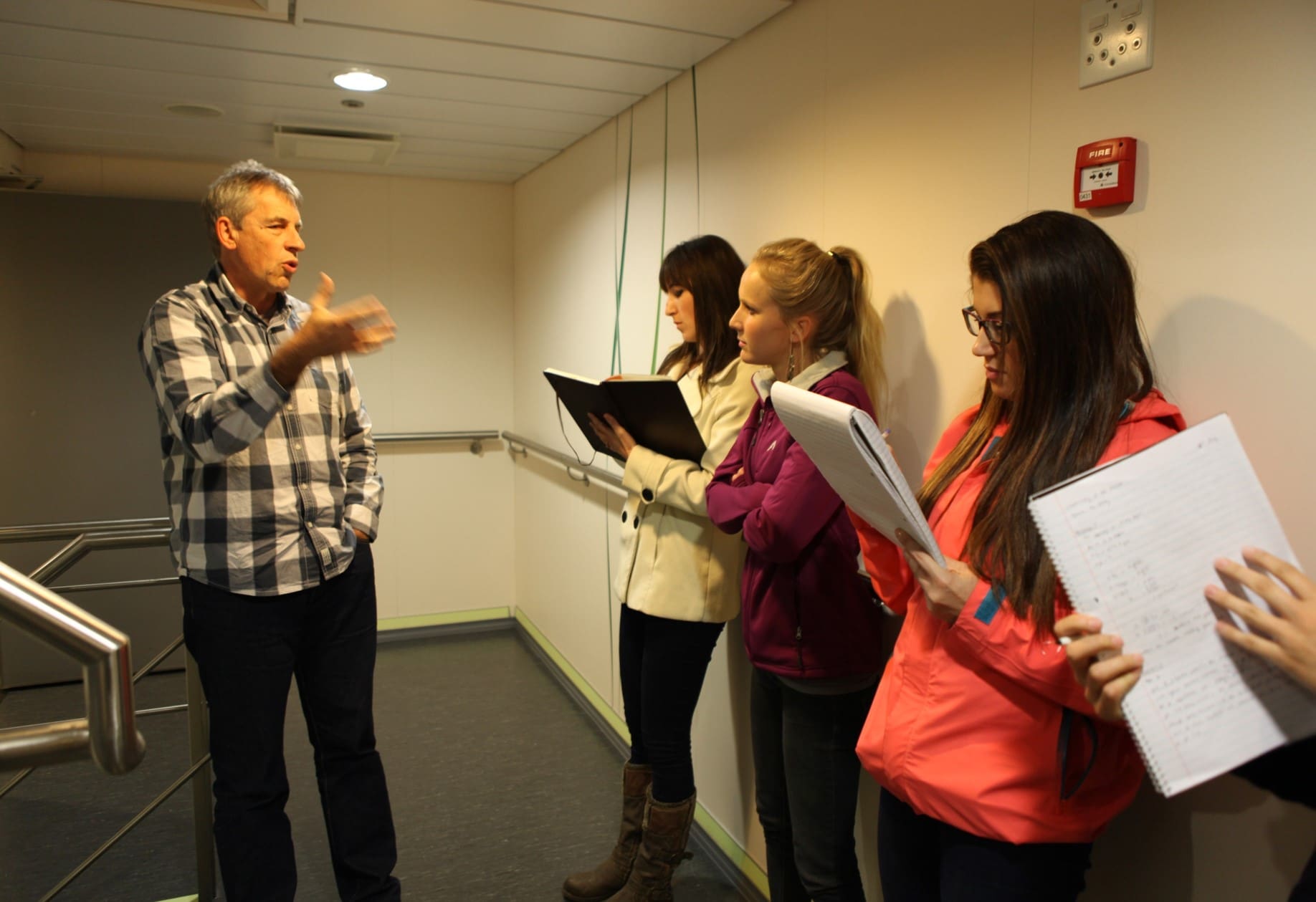 “I am proud of the SEAmester programme and how we have been able to develop linkages with traditionally non marine universities both through their students joining as SEAmester students or their own Lecturers joining the academic programme. The state-of-the-art research vessel, SA Agulhas II, provides such an incredible teaching and research platform for this programme; its size, comfort and shipboard facilities allow groups of 46 students and 30 lecturers to productively interact over a period of 10 days as can the photo of Prof Gammon teaching students in the ship’s stairwell shows so well!.”
“I am proud of the SEAmester programme and how we have been able to develop linkages with traditionally non marine universities both through their students joining as SEAmester students or their own Lecturers joining the academic programme. The state-of-the-art research vessel, SA Agulhas II, provides such an incredible teaching and research platform for this programme; its size, comfort and shipboard facilities allow groups of 46 students and 30 lecturers to productively interact over a period of 10 days as can the photo of Prof Gammon teaching students in the ship’s stairwell shows so well!.” My advice to the young generation: “Four words – always take the initiative! In the UK the only sea-going opportunity I had was to work on the River Tamar outside of Plymouth! In South Africa our students go to Antarctica! But it takes you to make that difference. We have so many wonderful opportunities in South Africa and access to such incredible marine programmes and platforms but the sparkplug to get started must come from you. All academics get frustrated by students not willing to engage with their surroundings and
My advice to the young generation: “Four words – always take the initiative! In the UK the only sea-going opportunity I had was to work on the River Tamar outside of Plymouth! In South Africa our students go to Antarctica! But it takes you to make that difference. We have so many wonderful opportunities in South Africa and access to such incredible marine programmes and platforms but the sparkplug to get started must come from you. All academics get frustrated by students not willing to engage with their surroundings and 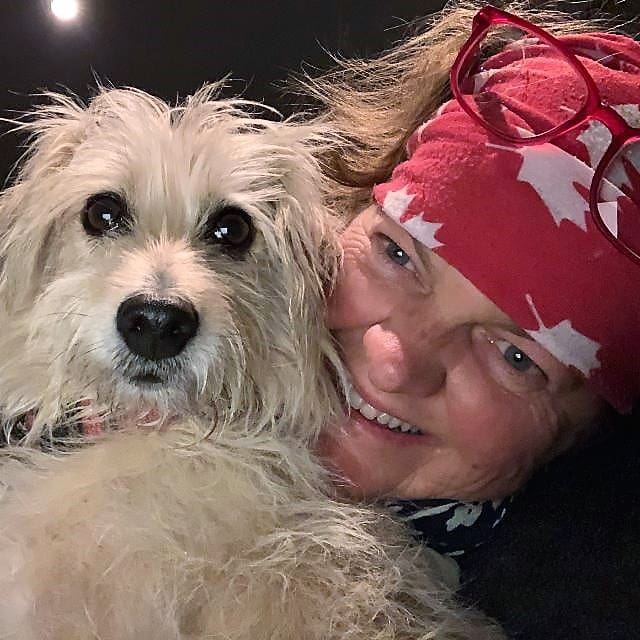 not even realise the enormous privilege it is to be on a research vessel such as the SA Agulhas II. You don’t have to be the brightest student in the class but by staying engaged, enthusiastic, interactive and dedicated to your studies you will always go much further in life. Opportunities are endless but it takes you to grab it!”
not even realise the enormous privilege it is to be on a research vessel such as the SA Agulhas II. You don’t have to be the brightest student in the class but by staying engaged, enthusiastic, interactive and dedicated to your studies you will always go much further in life. Opportunities are endless but it takes you to grab it!”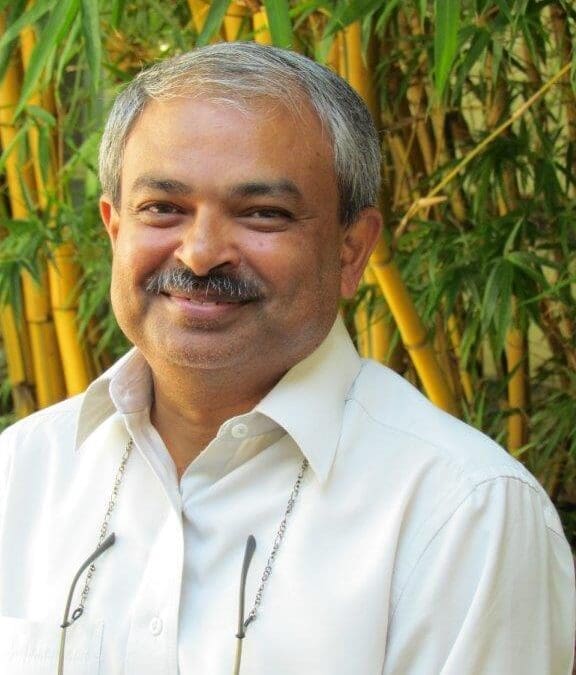

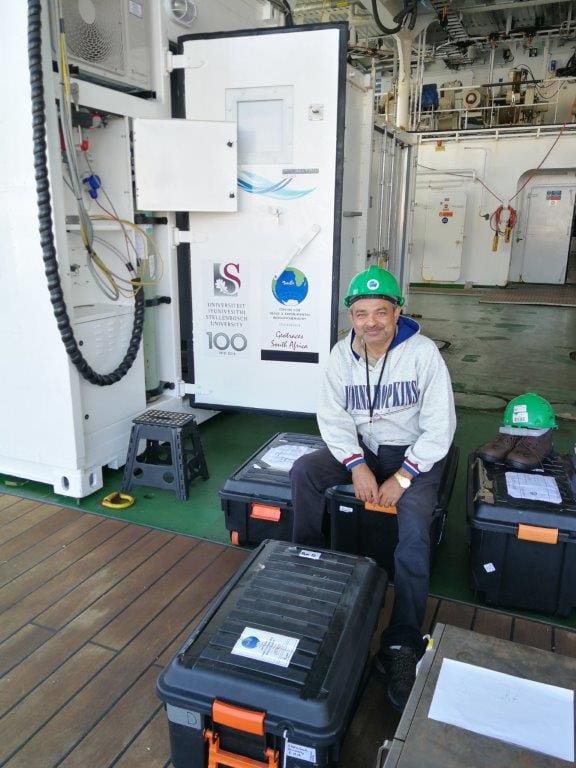


 Why you love your career in science
Why you love your career in science 
 Choosing a career in Science is not easy. There is always a pressure to go into fields where there are prospects of high paying jobs. One can survive in science only if they love what they are doing. My love developed from the sense of adventure that came with scientific research and travelling for fieldwork in remote places.
Choosing a career in Science is not easy. There is always a pressure to go into fields where there are prospects of high paying jobs. One can survive in science only if they love what they are doing. My love developed from the sense of adventure that came with scientific research and travelling for fieldwork in remote places.  Thanks to Science, I have been fortunate enough to touch all of the
Thanks to Science, I have been fortunate enough to touch all of the 

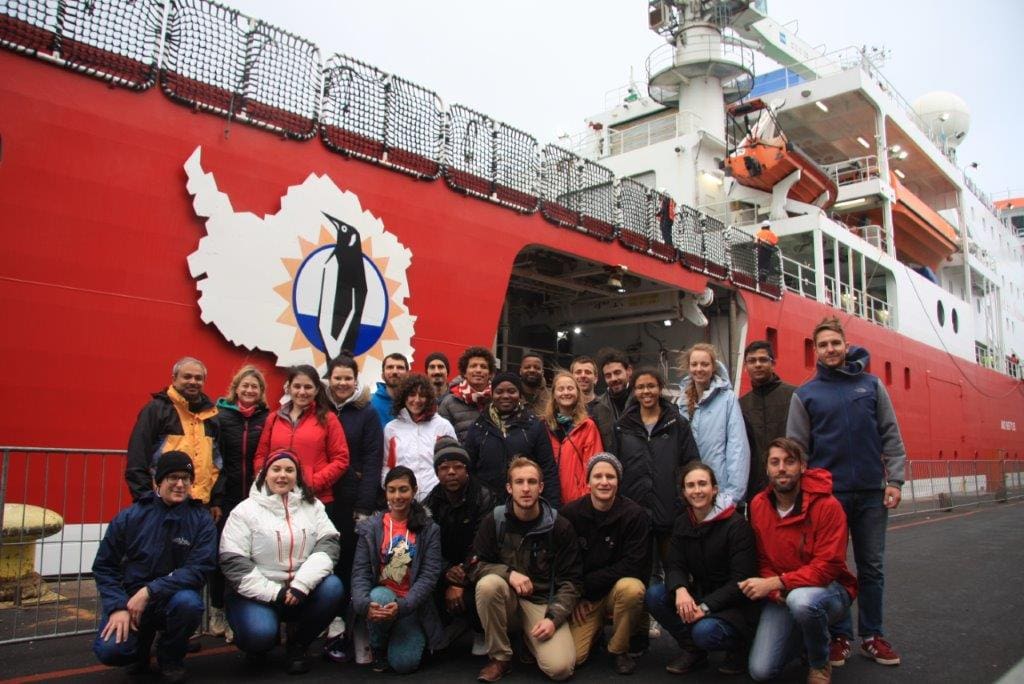 (Above: Images of Science Cruises in the Southern Ocean on the S.A. Agulhas II with Susan Fietz colleague and students) If you don’t ask the question “Why?” all the time until you run out of answers, you cannot be a scientist. Science thrives on curiosity and there is a lot to be curious about when it comes to the oceans. Oceans are truly the last frontier because we know more about space than oceans. Large parts of the oceans are unexplored and there are huge opportunities for one to make their mark. Marine chemistry or biogeochemistry in South Africa is highly underdeveloped, but this is a field that can answer the most critical questions such as climate change and anthropogenic influences on ocean processes, on which survival of the living planet depends. To be a good researcher in ocean sciences, you will have to have a good understanding of the principles and advanced knowledge of chemistry, physics, biology and mathematics and you will need an open mind to take on the teaching of these different fields while pursuing your focused research.
(Above: Images of Science Cruises in the Southern Ocean on the S.A. Agulhas II with Susan Fietz colleague and students) If you don’t ask the question “Why?” all the time until you run out of answers, you cannot be a scientist. Science thrives on curiosity and there is a lot to be curious about when it comes to the oceans. Oceans are truly the last frontier because we know more about space than oceans. Large parts of the oceans are unexplored and there are huge opportunities for one to make their mark. Marine chemistry or biogeochemistry in South Africa is highly underdeveloped, but this is a field that can answer the most critical questions such as climate change and anthropogenic influences on ocean processes, on which survival of the living planet depends. To be a good researcher in ocean sciences, you will have to have a good understanding of the principles and advanced knowledge of chemistry, physics, biology and mathematics and you will need an open mind to take on the teaching of these different fields while pursuing your focused research.




